The Importance of Feedback
- Posted January 21, 2022
- By Emily Boudreau
- Learning Design and Instruction
- Teachers and Teaching
- Technology and Media

Teachers know that it’s often not a question of if students will get stuck when working on a creative project but when . To help reimagine the classroom as a space in which students can look to each other, and not just the teacher, for feedback and inspiration, a team of researchers at the Creative Computing Lab , including Harvard Graduate School of Education professor Karen Brennan , Ph.D. student Paulina Haduong , and alums Mary Adelaide Williamson, Laura Peters, Sara Smolevitz, and Brian Yu, released an intermediate computer programming curriculum, Getting Unstuck . The curriculum was also co-designed and has been tested by teachers
“I believe very profoundly in the power of learning with and from others,” says Brennan. “It’s incredibly exciting to have your work seen by others, to have others respond to it. And in some ways, we don’t necessarily make as much space as we might in the classroom for that.”
However, as Brennan observes, one of the greatest obstacles to creative work is fear — fear of being wrong, fear of not looking smart in front of others — so receiving feedback from others can feel overwhelming. To help build a community that can learn together and from one another, the design team intentionally included activities that allow students to practice giving, receiving, and making sense of feedback about their projects. These activities can be done in pairs, small groups, or with the whole class. Students can give both verbal and written feedback. A few of those activities include:
- Red, Yellow, Green : Students receive feedback from three peers. Each peer provides something they’d change, something they wondered about, and something they liked. The student must then decide what they will work on next, based on the feedback they received.
- Hearts and Stars : Students share one thing they like about a project. Have them try using the sentence starter “I like the way you… because…” Then, students share one thing the project’s creator could try. Have them start their feedback with “Something you could do next is…”
- Gallery Walk : Students walk around the classroom and show their project to a classmate. The project sharer tells their partner something they like about their own work and a question they have about it. The feedback giver then shares something they like and something they’re wondering about. Students switch roles then move on to find a new partner.

Making Sense of It All
Once students have received feedback, the next challenge is interpreting that feedback and using it to spark the next step in the project. Yet students often receive conflicting feedback about their projects. Some of their peers may really like an element of the work while others might not be as crazy about it. According to Brennan, this is a key moment.
“Part of being a creative agent in the world is making sense of the feedback you get — listening to other people’s opinions, making sense of those, taking what is going to be helpful for you, and put aside that which is not helpful,” she says. “In those moments, kids are making sense of the world and advancing their learning and thinking.”
Key Takeaways
- When doing creative work, students will get stuck. Providing feedback on a draft is one of many ways to help students find a path forward.
- Students may need to practice giving feedback to cultivate a supportive learning community.
- Feedback may often be conflicting. Give students time to reflect and evaluate what their peers share with them about their work. Let them decide what they will keep and what they will put aside.
Additional Resources
- The Scratch Ed Community Archive
- Let’s Not All Make the Same Thing
- Harvard EdCast: Learning from Mistakes
- Happy Students Are Motivated Students

Usable Knowledge
Connecting education research to practice — with timely insights for educators, families, and communities
Related Articles

Writing Student-Friendly Climate Curriculum for Teachers

Reshaping Reading

Making Math “Almost Fun”
Alum develops curriculum to entice reluctant math learners
- SUGGESTED TOPICS
- The Magazine
- Newsletters
- Managing Yourself
- Managing Teams
- Work-life Balance
- The Big Idea
- Data & Visuals
- Reading Lists
- Case Selections
- HBR Learning
- Topic Feeds
- Account Settings
- Email Preferences
What Good Feedback Really Looks Like
- Craig Chappelow
- Cindy McCauley

Constructive criticism has its place.
Feedback — both positive and negative — is essential to helping managers enhance their best qualities and address their worst so they can excel at leading. Strengths-based development can, unfortunately, lull people into believing there are no areas in which they need to improve. So instead of encouraging people to avoid negative feedback, we should focus on how to deliver it in ways that minimize the fight-or-flight response. One approach is called Situation-Behavior-Impact (SBI). Feedback providers first note the time and place in which a behavior occurred. Then they describe the behavior — what they saw and heard. The final step is to describe the impact the behavior had in terms of the feedback providers’ thoughts, feelings or actions.
According to a recent Harvard Business Review cover story , it’s rarely useful to give feedback to colleagues. The authors argue that constructive criticism won’t help people excel and that, when you highlight someone’s shortcomings, you actually hinder their learning. They say that managers should encourage employees to worry less about their weaknesses and instead focus on their strengths.
- Craig Chappelow is a leadership solutions facilitator, Americas, at the Center for Creative Leadership.
- Cindy McCauley is a senior fellow, Americas, at the Center for Creative Leadership.
Partner Center

How it works
Transform your enterprise with the scalable mindsets, skills, & behavior change that drive performance.
Explore how BetterUp connects to your core business systems.
We pair AI with the latest in human-centered coaching to drive powerful, lasting learning and behavior change.
Build leaders that accelerate team performance and engagement.
Unlock performance potential at scale with AI-powered curated growth journeys.
Build resilience, well-being and agility to drive performance across your entire enterprise.
Transform your business, starting with your sales leaders.
Unlock business impact from the top with executive coaching.
Foster a culture of inclusion and belonging.
Accelerate the performance and potential of your agencies and employees.
See how innovative organizations use BetterUp to build a thriving workforce.
Discover how BetterUp measurably impacts key business outcomes for organizations like yours.
A demo is the first step to transforming your business. Meet with us to develop a plan for attaining your goals.

- What is coaching?
Learn how 1:1 coaching works, who its for, and if it's right for you.
Accelerate your personal and professional growth with the expert guidance of a BetterUp Coach.
Types of Coaching
Navigate career transitions, accelerate your professional growth, and achieve your career goals with expert coaching.
Enhance your communication skills for better personal and professional relationships, with tailored coaching that focuses on your needs.
Find balance, resilience, and well-being in all areas of your life with holistic coaching designed to empower you.
Discover your perfect match : Take our 5-minute assessment and let us pair you with one of our top Coaches tailored just for you.

Research, expert insights, and resources to develop courageous leaders within your organization.
Best practices, research, and tools to fuel individual and business growth.
View on-demand BetterUp events and learn about upcoming live discussions.
The latest insights and ideas for building a high-performing workplace.
- BetterUp Briefing
The online magazine that helps you understand tomorrow's workforce trends, today.
Innovative research featured in peer-reviewed journals, press, and more.
Founded in 2022 to deepen the understanding of the intersection of well-being, purpose, and performance
We're on a mission to help everyone live with clarity, purpose, and passion.
Join us and create impactful change.
Read the buzz about BetterUp.
Meet the leadership that's passionate about empowering your workforce.
For Business
For Individuals
5 benefits of feedback — and why it matters

Jump to section
Improved performance
Transferred ownership of professional development
Diffused office conflicts before they happen
Increased employee engagement
Give your people something they actually want
How often should employees receive feedback?
If you're in HR, it can feel like you're the sole driver of performance and development processes. And while you are responsible for kickstarting a culture of feedback within the organization, your success is entirely dependent on managers and employees embracing and owning it.
When employees feel comfortable sharing, asking for, and receiving analysis of their performance , you can expect notable changes in how your company operates. To exemplify the importance of feedback, here are five positive changes you can expect.
1. Improved performance at all levels
Feedback is a critical component in improving performance organization-wide and is a two-way street. Not only is it important for managers to regularly provide feedback to their direct reports, but employees should share it with their managers and their peers as well.
As the amount of feedback exchanged increases, it provides managers with insights into how their leadership skills . It also gives employees insights into their work from the people they work most closely with. And positive feedback has proven to have a positive impact on your business outcomes.
The result is that everyone is able to reach better decisions , improve performance, and generally succeed in their role.

2. Transferred ownership of professional development
Everyone has a unique set of strengths and developmental areas, making it difficult to apply a “one-size-fits-all” model to professional development . There are plenty of learning styles, like asynchronous learning or in-person workshops.
By implementing an easy and structured way to request feedback when it matters most, you are actively putting people in the driver’s seat of their development instead of having to constantly initiate the process.
Some of the most successful people take the opportunity to ask for feedback at the end of a big meeting or project to ensure they get actionable insights in a timely, contextualized manner.
With this shift, people become accustomed to requesting feedback whenever they want or need it, creating a workforce of empowered employees , while also taking pressure off HR.
3. Diffused office conflicts before they happen
Another benefit of a strong feedback culture is that it gives employees the tools to address issues before they escalate. When people don’t feel able to share feedback with one another even on the smaller things, over time they can transform into workplace conflict .
On the other hand, when people are used to regularly sharing feedback, they become more comfortable with having these difficult conversations .
This means they won’t feel anxious about asking their co-workers to speak lower when on the phone, or to be more consistent with having their part of a project completed on time.
Getting into the habit of sharing feedback means they are better equipped to address any kind of situation rather than bottling it up.

4. Increased employee engagement
There is a strong correlation between feedback exchange and employee engagement . Not only because of its potential to resolve issues quickly and increase knowledge sharing, but also because it creates a way for the team and individual successes to be recognized more regularly.
Remember feedback isn’t just about personal development . It's also an opportunity to celebrate wins big and small.
Understandably, when people feel valued and recognized for their efforts they feel motivated and engaged . In fact, 72% of employees in a recent survey ranked recognition as having the greatest impact on engagement.
5. Giving your people something they actually want
According to PwC, nearly 60% of employees surveyed stated that they would like feedback on a daily or weekly basis — a number that increased to 72% for employees under age 30 .
There are many reasons why people don’t get the feedback they are looking for: it’s time-consuming, stressful to give constructive feedback , and in the beginning, it’s not easy.
However, by focusing on building an employee-driven feedback culture, you can break down some of these barriers. Supported by coaching — and with additional training and resources — you can create a process where people can freely exchange feedback with anyone within the organization.
When building out a feedback system, it’s important to be strategic about frequency. As we mentioned, many employees like to receive feedback weekly if not daily. That said, it’s important for the feedback to remain relevant and valuable to the employee.
To make the most impact, it can be helpful for managers to ask the following questions before offering feedback:
- Is this a pivotal point for the project, or role?
- Are they learning a new skill with delicate or risky implementation? (For example, presenting to the board for budget approval.)
- Do you simply want a check-in? (For example, your team is working on an important project with their peers and lots of change is happening simultaneously.)
Once managers and teams have these questions answered, they should have a good idea of whether or not to offer their feedback at the time.
Try empowering your organization through feedback
It’s clear that effective feedback has its advantages. By leveraging this form of communication, teams can feel more confident and empowered in their roles and more engaged in their work. Once you have a cadence that works for the team, you can start to see some of these benefits make their way through your organization.
Transform your life
Make meaningful changes and become the best version of yourself. BetterUp's professional Coaches are here to support your personal growth journey.
Madeline Miles
Madeline is a writer, communicator, and storyteller who is passionate about using words to help drive positive change. She holds a bachelor's in English Creative Writing and Communication Studies and lives in Denver, Colorado. In her spare time, she's usually somewhere outside (preferably in the mountains) — and enjoys poetry and fiction.
How managers get upward feedback from their team
How to get feedback from your employees, how to empower your team through feedback, how to give feedback using this 4-step framework, are you receptive to feedback follow this step-by-step guide, how to give constructive feedback as a manager, how a performance review template improves the feedback process, should you use the feedback sandwich 7 pros and cons, handle feedback like a boss and make it work for you, similar articles, what is groupthink and how do you avoid it, 17 positive feedback examples to develop a winning team, why your company needs a strong feedback culture, why coworker feedback is so important and 5 ways to give it, feedback in communication: 5 areas to become a better communicator, 5 reasons why your company needs real-time feedback, 5+ ways to establish taking ownership as a core value at work, stay connected with betterup, get our newsletter, event invites, plus product insights and research..
3100 E 5th Street, Suite 350 Austin, TX 78702
- Platform Overview
- Integrations
- Powered by AI
- BetterUp Lead
- BetterUp Manage™
- BetterUp Care™
- Sales Performance
- Diversity & Inclusion
- Case Studies
- Why BetterUp?
- About Coaching
- Find your Coach
- Career Coaching
- Communication Coaching
- Life Coaching
- News and Press
- Leadership Team
- Become a BetterUp Coach
- BetterUp Labs
- Center for Purpose & Performance
- Leadership Training
- Business Coaching
- Contact Support
- Contact Sales
- Privacy Policy
- Acceptable Use Policy
- Trust & Security
- Cookie Preferences

Getting Feedback
What this handout is about.
Sometimes you’d like feedback from someone else about your writing, but you may not be sure how to get it. This handout describes when, where, how and from whom you might receive effective responses as you develop as a writer.
Why get feedback on your writing?
You’ll become a better writer, and writing will become a less painful process. When might you need feedback? You might be just beginning a paper and want to talk to someone else about your ideas. You might be midway through a draft and find that you are unsure about the direction you’ve decided to take. You might wonder why you received a lower grade than you expected on a paper, or you might not understand the comments that a TA or professor has written in the margins. Essentially, asking for feedback at any stage helps you break out of the isolation of writing. When you ask for feedback, you are no longer working in a void, wondering whether or not you understand the assignment and/or are making yourself understood. By seeking feedback from others, you are taking positive, constructive steps to improve your own writing and develop as a writer.
Why people don’t ask for feedback
- You worry that the feedback will be negative. Many people avoid asking others what they think about a piece of writing because they have a sneaking suspicion that the news will not be good. If you want to improve your writing, however, constructive criticism from others will help. Remember that the criticism you receive is only criticism of the writing and not of the writer.
- You don’t know whom to ask. The person who can offer the most effective feedback on your writing may vary depending on when you need the feedback and what kind of feedback you need. Keep in mind, though, that if you are really concerned about a piece of writing, almost any thoughtful reader (e.g., your roommate, mother, R.A., brother, etc.) can provide useful feedback that will help you improve your writing. Don’t wait for the expert; share your writing often and with a variety of readers.
- You don’t know how to ask. It can be awkward to ask for feedback, even if you know whom you want to ask. Asking someone, “Could you take a look at my paper?” or “Could you tell me if this is OK?” can sometimes elicit wonderfully rich responses. Usually, though, you need to be specific about where you are in the writing process and the kind of feedback that would help. You might say, “I’m really struggling with the organization of this paper. Could you read these paragraphs and see if the ideas seem to be in the right order?”
- You don’t want to take up your teacher’s time. You may be hesitant to go to your professor or TA to talk about your writing because you don’t want to bother them. The office hours that these busy people set aside, though, are reserved for your benefit, because the teachers on this campus want to communicate with students about their ideas and their work. Faculty can be especially generous and helpful with their advice when you drop by their office with specific questions and know the kinds of help you need. If you can’t meet during the instructor’s office hours, try making a special appointment. If you find that you aren’t able to schedule a time to talk with your instructor, remember that there are plenty of other people around you who can offer feedback.
- You’ve gotten feedback in the past that was unhelpful. If earlier experiences haven’t proved satisfactory, try again. Ask a different person, or ask for feedback in a new way. Experiment with asking for feedback at different stages in the writing process: when you are just beginning an assignment, when you have a draft, or when you think you are finished. Figure out when you benefit from feedback the most, the kinds of people you get the best feedback from, the kinds of feedback you need, and the ways to ask for that feedback effectively.
- You’re working remotely and aren’t sure how to solicit help. Help can feel “out of sight, out of mind” when working remotely, so it may take extra effort and research to reach out. Explore what resources are available to you and how you can access them. What type of remote feedback will benefit you most? Video conferencing, email correspondence, phone conversation, written feedback, or something else? Would it help to email your professor or TA ? Are you looking for the back and forth of a real-time conversation, or would it be more helpful to have written feedback to refer to as you work? Can you schedule an appointment with the Writing Center or submit a draft for written feedback ? Could joining or forming an online writing group help provide a source of feedback?
Possible writing moments for feedback
There is no “best time” to get feedback on a piece of writing. In fact, it is often helpful to ask for feedback at several different stages of a writing project. Listed below are some parts of the writing process and some kinds of feedback you might need in each. Keep in mind, though, that every writer is different—you might think about these issues at other stages of the writing process, and that’s fine.
- The beginning/idea stage: Do I understand the assignment? Am I gathering the right kinds of information to answer this question? Are my strategies for approaching this assignment effective ones? How can I discover the best way to develop my early ideas into a feasible draft?
- Outline/thesis: I have an idea about what I want to argue, but I’m not sure if it is an appropriate or complete response to this assignment. Is the way I’m planning to organize my ideas working? Does it look like I’m covering all the bases? Do I have a clear main point? Do I know what I want to say to the reader?
- Rough draft: Does my paper make sense, and is it interesting? Have I proven my thesis statement? Is the evidence I’m using convincing? Is it explained clearly? Have I given the reader enough information? Does the information seem to be in the right order? What can I say in my introduction and conclusion?
- Early polished draft: Are the transitions between my ideas smooth and effective? Do my sentences make sense individually? How’s my writing style?
- Late or final polished draft: Are there any noticeable spelling or grammar errors? Are my margins, footnotes, and formatting okay? Does the paper seem effective? Is there anything I should change at the last minute?
- After the fact: How should I interpret the comments on my paper? Why did I receive the grade I did? What else might I have done to strengthen this paper? What can I learn as a writer about this writing experience? What should I do the next time I have to write a paper?
A note on asking for feedback after a paper has been graded
Many people go to see their TA or professor after they receive a paper back with comments and a grade attached. If you seek feedback after your paper is returned to you, it makes sense to wait 24 hours before scheduling a meeting to talk about it. If you are angry or upset about a grade, the day off gives you time to calm down and put things in perspective. More important, taking a day off allows you to read through the instructor’s comments and think about why you received the grade that you did. You might underline or circle comments that were confusing to you so that you can ask about them later. You will also have an opportunity to reread your own writing and evaluate it more critically yourself. After all, you probably haven’t seen this piece of work since you handed it in a week or more ago, and refreshing your memory about its merits and weaknesses might help you make more sense of the grade and the instructor’s comments.
Also, be prepared to separate the discussion of your grade from the discussion of your development as a writer. It is difficult to have a productive meeting that achieves both of these goals. You may have very good reasons for meeting with an instructor to argue for a better grade, and having that kind of discussion is completely legitimate. Be very clear with your instructor about your goals. Are you meeting to contest the grade your paper received and explain why you think the paper deserved a higher one? Are you meeting because you don’t understand why your paper received the grade it did and would like clarification? Or are you meeting because you want to use this paper and the instructor’s comments to learn more about how to write in this particular discipline and do better on future written work? Being up front about these distinctions can help you and your instructor know what to expect from the conference and avoid any confusion between the issue of grading and the issue of feedback.
Kinds of feedback to ask for
Asking for a specific kind of feedback can be the best way to get advice that you can use. Think about what kinds of topics you want to discuss and what kinds of questions you want to ask:
- Understanding the assignment: Do I understand the task? How long should it be? What kinds of sources should I be using? Do I have to answer all of the questions on the assignment sheet or are they just prompts to get me thinking? Are some parts of the assignment more important than other parts?
- Factual content: Is my understanding of the course material accurate? Where else could I look for more information?
- Interpretation/analysis: Do I have a point? Does my argument make sense? Is it logical and consistent? Is it supported by sufficient evidence?
- Organization: Are my ideas in a useful order? Does the reader need to know anything else up front? Is there another way to consider ordering this information?
- Flow: Do I have good transitions? Does the introduction prepare the reader for what comes later? Do my topic sentences accurately reflect the content of my paragraphs? Can the reader follow me?
- Style: Comments on earlier papers can help you identify writing style issues that you might want to look out for. Is my writing style appealing? Do I use the passive voice too often? Are there too many “to be” verbs?
- Grammar: Just as with style, comments on earlier papers will help you identify grammatical “trouble spots.” Am I using commas correctly? Do I have problems with subject-verb agreement?
- Small errors: Is everything spelled right? Are there any typos?
Possible sources of feedback and what they’re good for
Believe it or not, you can learn to be your own best reader, particularly if you practice reading your work critically. First, think about writing problems that you know you have had in the past. Look over old papers for clues. Then, give yourself some critical distance from your writing by setting it aside for a few hours, overnight, or even for a couple of days. Come back to it with a fresh eye, and you will be better able to offer yourself feedback. Finally, be conscious of what you are reading for. You may find that you have to read your draft several times—perhaps once for content, once for organization and transitions, and once for style and grammar. If you need feedback on a specific issue, such as passive voice, you may need to read through the draft one time alone focusing on that issue. Whatever you do, don’t count yourself out as a source of feedback. Remember that ultimately you care the most and will be held responsible for what appears on the page. It’s your paper.
A classmate (a familiar and knowledgeable reader)
When you need feedback from another person, a classmate can be an excellent source. A classmate knows the course material and can help you make sure you understand the course content. A classmate is probably also familiar with the sources that are available for the class and the specific assignment. Moreover, you and your classmates can get together and talk about the kinds of feedback you both received on earlier work for the class, building your knowledge base about what the instructor is looking for in writing assignments.
Your TA (an expert reader)
Your TA is an expert reader—they are working on an advanced degree, either a Master’s or a Ph.D., in the subject area of your paper. Your TA is also either the primary teacher of the course or a member of the teaching team, so they probably had a hand in selecting the source materials, writing the assignment, and setting up the grading scheme. No one knows what the TA is looking for on the paper better than the TA , and most of the TAs on campus would be happy to talk with you about your paper.
Your professor (a very expert reader)
Your professor is the most expert reader you can find. They have a Ph.D. in the subject area that you are studying, and probably also wrote the assignment, either alone or with help from TAs. Like your TA, your professor can be the best source for information about what the instructor is looking for on the paper and may be your best guide in developing into a strong academic writer.
Your roommate/friend/family member (an interested but not familiar reader)
It can be very helpful to get feedback from someone who doesn’t know anything about your paper topic. These readers, because they are unfamiliar with the subject matter, often ask questions that help you realize what you need to explain further or that push you to think about the topic in new ways. They can also offer helpful general writing advice, letting you know if your paper is clear or your argument seems well organized, for example. Ask them to read your paper and then summarize for you what they think its main points are.
The Writing Center (an interested but not familiar reader with special training)
While the Writing Center staff may not have specialized knowledge about your paper topic, our writing coaches are trained to assist you with your writing needs. We cannot edit or proofread for you, but we can help you identify problems and address them at any stage of the writing process. The Writing Center’s coaches see thousands of students each year and are familiar with all kinds of writing assignments and writing dilemmas.
Other kinds of resources
If you want feedback on a writing assignment and can’t find a real live person to read it for you, there are other places to turn. Check out the Writing Center’s handouts . These resources can give you tips for proofreading your own work, making an argument, using commas and transitions, and more. You can also try the spell/grammar checker on your computer. This shouldn’t be your primary source of feedback, but it may be helpful.
A word about feedback and plagiarism
Asking for help on your writing does not equal plagiarism, but talking with classmates about your work may feel like cheating. Check with your professor or TA about what kinds of help you can get legally. Most will encourage you to discuss your ideas about the reading and lectures with your classmates. In general, if someone offers a particularly helpful insight, it makes sense to cite them in a footnote. The best way to avoid plagiarism is to write by yourself with your books closed. (For more on this topic, see our handout on plagiarism .)
What to do with the feedback you get
- Don’t be intimidated if your professor or TA has written a lot on your paper. Sometimes instructors will provide more feedback on papers that they believe have a lot of potential. They may have written a lot because your ideas are interesting to them and they want to see you develop them to their fullest by improving your writing.
- By the same token, don’t feel that your paper is garbage if the instructor DIDN’T write much on it. Some graders just write more than others do, and sometimes your instructors are too busy to spend a great deal of time writing comments on each individual paper.
- If you receive feedback before the paper is due, think about what you can and can’t do before the deadline. You sometimes have to triage your revisions. By all means, if you think you have major changes to make and you have time to make them, go for it. But if you have two other papers to write and all three are due tomorrow, you may have to decide that your thesis or your organization is the biggest issue and just focus on that. The paper might not be perfect, but you can learn from the experience for the next assignment.
- Read ALL of the feedback that you get. Many people, when receiving a paper back from their TA or professor, will just look at the grade and not read the comments written in the margins or at the end of the paper. Even if you received a satisfactory grade, it makes sense to carefully read all of the feedback you get. Doing so may help you see patterns of error in your writing that you need to address and may help you improve your writing for future papers and for other classes.
- If you don’t understand the feedback you receive, by all means ask the person who offered it. Feedback that you don’t understand is feedback that you cannot benefit from, so ask for clarification when you need it. Remember that the person who gave you the feedback did so because they genuinely wanted to convey information to you that would help you become a better writer. They wouldn’t want you to be confused and will be happy to explain their comments further if you ask.
- Ultimately, the paper you will turn in will be your own. You have the final responsibility for its form and content. Take the responsibility for being the final judge of what should and should not be done with your essay.
- Just because someone says to change something about your paper doesn’t mean you should. Sometimes the person offering feedback can misunderstand your assignment or make a suggestion that doesn’t seem to make sense. Don’t follow those suggestions blindly. Talk about them, think about other options, and decide for yourself whether the advice you received was useful.
Final thoughts
Finally, we would encourage you to think about feedback on your writing as a way to help you develop better writing strategies. This is the philosophy of the Writing Center. Don’t look at individual bits of feedback such as “This paper was badly organized” as evidence that you always organize ideas poorly. Think instead about the long haul. What writing process led you to a disorganized paper? What kinds of papers do you have organization problems with? What kinds of organization problems are they? What kinds of feedback have you received about organization in the past? What can you do to resolve these issues, not just for one paper, but for all of your papers? The Writing Center can help you with this process. Strategy-oriented thinking will help you go from being a writer who writes disorganized papers and then struggles to fix each one to being a writer who no longer writes disorganized papers. In the end, that’s a much more positive and permanent solution.
You may reproduce it for non-commercial use if you use the entire handout and attribute the source: The Writing Center, University of North Carolina at Chapel Hill
Make a Gift
Table of Contents
Ai, ethics & human agency, collaboration, information literacy, writing process, critique – a research-based guide to criticism in academic & professional writing.
- © 2023 by Joseph M. Moxley - University of South Florida
Learn about the psychology and types of critique so you can adjust your critiques to help others' develop their writing and ideas. Critique may be formative (focused on recommended revisions and edits ) or summative (focused on grading and ranking). Critique can help writers, speakers, knowledge worker s improve or it can undermine and silence them. Learn about different feedback styles so you can discern how best to give (and receive) critical feedback. And, perhaps even more importantly, learn to moderate your emotions when receiving difficult feedback.

What is Critique?
Critique is the systematic evaluation and assessment of a creative or intellectual work—often a text—to analyze its effectiveness in content, structure, and style, among other factors like originality, relevance, and impact. The goal is usually either to improve the work through formative feedback or to provide a final evaluation via summative feedback.
Formative feedback aims to offer specific ways to improve a text’s ability to engage and inform its audience. For example, in an academic setting, a teacher might provide in-depth comments on a student’s essay draft, suggesting more effective ways to structure arguments or clarify points.
Summative feedback, in contrast, provides an overall assessment and often serves to justify a grade; for instance, the final letter grade on a term paper evaluates your comprehensive understanding and execution of the assignment.
Critique occurs in a variety of settings, including teacher grading, peer review, self-critique, or professional editing, each with unique conventions and objectives.
The ability to offer and receive critique is not merely an academic requirement but a transferable skill that holds value in professional and workplace settings, where textual communication often determines the success of projects and collaborations. Furthermore, effective critique fosters a culture of continuous improvement and intellectual rigor, enabling not only the refinement of individual texts but also the development of critical thinking skills vital to both academic and professional success.
Related Concepts: Contract Grading ; Empathetic Information Literacy ; Leadership ; Openness
The 6 Flavors of Critique: Your Guide in School and the Workplace 🍦
Critique is your secret sauce whether you’re in academia or the workforce. Here’s the scoop.
1️⃣ Formative Feedback: The Coach 🏋️
Think of this as real-time guidance from your professors, managers, or clients. They’re helping you tweak ongoing projects to reach their full potential. 🌟
2️⃣ Summative Feedback: The Scoreboard ⚖️
This is your final grade or performance review—your ultimate evaluation in academic or professional settings. 🏆
3️⃣ Rhetorical Feedback: The Strategy Guru 🎯
This is Sherlock Holmes meets strategic planning. It’s about understanding the “who, what, where, when, and why” behind your work. Whether it’s Audience Awareness 🎯, Medium 📝, Timing (Kairos) ⏰, Purpose 🎭, Subject 📚, Text Composition 📜, or your role as a writer, speaker, or knowledge worker 👩💻👨💻—all these elements are on the radar. 🕵️
4️⃣ Global vs. Local Critique: Big Picture to Details 🌍🔍
Global critiques focus on overarching themes, while local critiques zoom in on the finer points like sentence structure and word choice. 🖋️
5️⃣ Specialized Critiques: The Toolkit 🛠️
- Side Notes : Quick hits for details. 📝
- Rubric-based : Scoring key elements like organization. 📊
- Endnotes : A recap of what rocked and what didn’t. 🎸
- Line-by-Line Editing : A meticulous walkthrough to polish each sentence. 🧼
6️⃣ Radical Transparency: The Truth Bomb 💣
Coined by Ray Dalio, founder of Bridgewater Associates, Radical Transparency emphasizes a culture of open communication, honest feedback, and shared information for informed decision-making. It’s more than just being blunt—it’s about fostering trust and collaboration throughout the team. 🤝
Constructive critique is essential in this transparent culture. It offers continuous learning and improvement opportunities, making your organization—whether it’s a classroom, a startup, or a Fortune 500 company—more agile and innovative. 🌱
However, Dalio critiques traditional education for not preparing us for this level of openness. He argues that to fit into a radically transparent culture, we need the skill to both give and receive effective critique—a skill often underemphasized but crucial in both academic and professional settings. 🎓🏢
By championing Radical Transparency and effective critique, Dalio aims to create a dynamic, inclusive, and high-performing environment. His advocacy underscores the importance of these concepts not just in the business realm but in our broader journey of personal and professional growth. 🌟
Tips for Giving Critiques to Others
Before diving into the critique, it’s essential to gauge what type or genre of feedback would be most beneficial for the situation at hand. Whether it’s formative, summative, global, local, or even rooted in radical transparency, your approach should align with both the project’s stage and the specific needs of your peer or colleague.
Establish Openness for Feedback
- Begin with an initial conversation to ensure the other party is open to critique. This sets the stage for a more constructive and receptive dialogue.
Clarify Your Intentions
- Be explicit about your aim in offering feedback. Is it to improve the project? To offer a different perspective? Setting the tone upfront minimizes misunderstandings.
Identify Blind Spots 🎯
- When well-versed in a subject, people can inadvertently omit crucial information. Help them see what they might be missing.
Address Emotional Biases 😌
- Emotional investment in a topic can cloud judgment. Point out where this may be affecting the work, but do so tactfully.
Consider the Audience 👥
- If the project seems to neglect the intended audience’s background or needs, highlight this. The goal is a message that resonates with its recipients.
Spotlight Gaps and Inconsistencies 🕵️♀️
- Are there logical flaws or gaps in reasoning? Identifying these can help transform the work from “writer-based prose” to “reader-based prose.”
Summarize and Suggest 📝
- End with a summary of the major points you’ve discussed, along with concrete suggestions for improvement.
By sticking to these tips and tailoring your feedback style to the situation, you can ensure that your critique is not only insightful but also encourages a culture of growth and improvement.
Tips for Receiving Critiques from Others
Receiving critique is an art as much as giving it. There are times to seek feedback and times when it might be premature. Recognizing when you’re ready for a critique—be it formative, summative, or another genre—will help you make the most of the process. Here’s how to gracefully and productively handle critiques.
Assess the Timing 🕒
- Critique can be more or less useful depending on where you are in the writing process . If your project or idea is still in a nascent stage, external input may derail rather than guide you.
Be Open to Receiving Feedback 🎧
- Whenever you do seek critique, prepare yourself mentally to be open. The objective is your growth, even if that involves some growing pains.
Manage Your Emotions 😌
- Critique can hit close to home, but remember to separate your work from your self-worth. Breathe, listen, and manage your emotions so they don’t manage you.
Understand the Intentions 👀
- Different critiques serve different purposes. Know whether the critique aims to guide you (formative) or evaluate your end product (summative).
Avoid Being Defensive 🛡️
- Even if the critique stings, resist the impulse to immediately defend your choices. Instead, listen actively and ask clarifying questions.
Reflect and Consider 🤔
- Take the time to really think about the feedback. Not all critiques will apply; you’re allowed to reject feedback after thoughtful consideration.
Understand Audience Concerns 🎯
- If the critique suggests you’re not meeting your audience’s needs or expectations, that’s important feedback to consider in your revisions.
Apply or Adapt 🔄
- Thoughtfully integrate the feedback that resonates with you into your work. Use each critique as a stepping stone for improvement.
Say Thanks 🙏
- Always thank your critique-giver. Whether or not you agree with their perspective, they’ve offered you a new lens through which to view your work.
By understanding when to seek critique and being prepared to manage your reactions to it, you can maximize the benefits of feedback and minimize its potential pitfalls. Keep in mind that receiving critique is not just about immediate improvements, but also about fostering a mindset conducive to long-term growth and development.
Is all feedback useful?
Critique is a complex human phenomenon. At times critique can be messy, chaotic, and counterproductive. It can leave writers mute, feeling futile.
Feedback can be destructive, a way of controlling and silencing others. Feedback can be contaminated by jealousy and Machiavellian power moves.
Sometimes feedback is only partially correct. Truth comes in shades of gray. Not all feedback is equal. Part of professionalism in the context of composing is not to be overly emotional about tough critiques. To progress as a writer, speaker, knowledge worker . . . you need to learn to sort through critiques, reject some suggestions, and seriously consider other suggestions.
Some critiques are false or misleading. There are instances when you really do know better, when you should ignore someone’s feedback. It’s not unusual for an audience (bosses, teachers, peers) to fail to understand you because they were rushed or preoccupied. And it could be true that the draft you shared was a bit too underdeveloped for your audience to see its potential or provide helpful critiques.
What are the dangers of critique?

Critique can have a destructive influence on writers–particularly young people who are first learning how to write. Perhaps this is even more true for younger students who haven’t yet mastered the basics of composing , rhetoric , invention , revision , style , or editing
On occasion, people can be cruel and insensitive. Perhaps the writer struggled mightily and wrote countless drafts yet came at the document without a strong linguistic or literary background. Perhaps the writer had far less knowledge of the topic than the reader critic. Or perhaps the writer was learning a new genre and new research methods .
Aware of the emotionally charged nature of critique, writing teachers, instructors, and professors in higher-education institutions are sometimes timorous about providing real critique. Grade inflation and student evaluations have moved the grading curve in the humanities from a B to A range, especially for adjunct faculty, assistant professors, and non-tenured faculty. The result, as Garrison Keillor so aptly satirizes in the fictional community of Lake Wobegon, where “ all the women are strong, all the men are good-looking, and all the children are above average .”
Yet the role of critique is even more complicated than all that. Why? Because sometimes the words on the page are more than the words on the page. Sometimes they reflect the lifeforce of the rhetor. Sometimes for the writer, the words on the page are more than the words on a page. This phenomenon has been described by Compositionists as writer-based prose .
The idea behind writer-based prose is that the reviewer may not really know what the writer intended because of the ambiguities of their text. Sometimes, the writer-based prose has amazing innovative potential that the would-be critic is simply not sophisticated enough to discern. Appropriating the student’s text–that is rewriting it as the reviewer would prefer it to be written–could be a destructive act. To help the writer’s original intention be realized, the reviewer may be better off just sharing to the rhetor how confusing they find the text to be.
Elbow , P., & Belanoff , P. (1989). Sharing and responding . McGraw-Hill.
Related Articles:

Provide Feedback in Group Situations
Suggested edits.
- Please select the purpose of your message. * - Corrections, Typos, or Edits Technical Support/Problems using the site Advertising with Writing Commons Copyright Issues I am contacting you about something else
- Your full name
- Your email address *
- Page URL needing edits *
- Phone This field is for validation purposes and should be left unchanged.

- Joseph M. Moxley
Follow these strategies in order to give and get constructive critique. Review research and theory on collaboration in team settings.
Featured Articles

Academic Writing – How to Write for the Academic Community

Professional Writing – How to Write for the Professional World

Credibility & Authority – How to Be Credible & Authoritative in Speech & Writing
Feedback and Its Importance in Business Essay
Feedback is usually a review or statement of opinion about the service provided or the work done. This type of communication is common both in relations between an employee and a client, and an employee and an employer. The importance of such a tool is due to the fact that it contributes to the timely adjustment of the employee’s actions so that he best achieves the goal. In addition, with the help of feedback, you can confirm the correctness of the actions of the individual. It is important to note that there are both positive and negative types of such a relationship, which differ in their goals. So, if a positive review is intended to encourage the process performed by an employee, then a negative one is used to change the vector of work. An example would be when a worker receives a message that a task was completed successfully, they can move on to the next step.
Here you can clearly see that the employee is going in the right direction, which means the feedback is positive. If it happens that the review indicates the need to redo the work, since errors or shortcomings are exposed, then such a review is treated as negative (Primeast US, 2016). It is necessary to choose the right way to leave a review, namely, to observe the correct subordination form, business tone, not to switch to insults or jokes. This will allow both criticism and praise to be constructive so that it can be handled without putting the worker out of action. It is also worth receiving feedback in a balanced, calm and not tired state in order to control reactions and emotions. An employee, as a rule, does not know in advance what kind of feedback they sent him, and in order not to break loose, it is necessary to be ready for anything. In addition, it is often appropriate to practice remote feedback to avoid interpersonal conflicts. This is done through corporate mail or special sites for leaving reviews.
Primeast US. (2016). Constructive feedback for managers: giving feedback effectively [Video]. YouTube. Web.
- Chicago (A-D)
- Chicago (N-B)
IvyPanda. (2023, January 4). Feedback and Its Importance in Business. https://ivypanda.com/essays/feedback-and-its-importance-in-business/
"Feedback and Its Importance in Business." IvyPanda , 4 Jan. 2023, ivypanda.com/essays/feedback-and-its-importance-in-business/.
IvyPanda . (2023) 'Feedback and Its Importance in Business'. 4 January.
IvyPanda . 2023. "Feedback and Its Importance in Business." January 4, 2023. https://ivypanda.com/essays/feedback-and-its-importance-in-business/.
1. IvyPanda . "Feedback and Its Importance in Business." January 4, 2023. https://ivypanda.com/essays/feedback-and-its-importance-in-business/.
Bibliography
IvyPanda . "Feedback and Its Importance in Business." January 4, 2023. https://ivypanda.com/essays/feedback-and-its-importance-in-business/.
- Humour and Jokes: What's So Funny?
- Why Do People Tolerate Class Subordination?
- Psychological Research in Non-Governmental Agency
- The Lockheed Martin Firm's Cultural Communications
- Netflix: Communication Styles
- Netflix: Communication Strategy
- Leadership Communication: Challenges and Impacts
- The Groupthink Phenomenon in Business

- Employee Development
What is feedback and why is feedback important?
Feedback, one of the most powerful communication tools, plays a crucial role in organizational development. But what is feedback? In essence, feedback is a communication process that involves managers and employees engaging in the analysis and assessment of situations and behaviors. Its purpose is to identify areas for improvement or reinforce strengths, fostering personal and professional growth within the organization.
As you can imagine, it is a vital process for all types of companies for many reasons: feedback helps employees to improve their skills and achieve their goals. Not to mention, feedback enhances the productivity and performance of the company. This is why it is so important to learn what feedback is, its importance, how to ask for feedback and how to give feedback correctly .
In short, it is an essential method within any organization that wants to enhance professional growth of its employees. In this article, we will take a closer look at what feedback is and why it is important for companies and their employees. So if you want to learn what feedback is , keep reading!
What is feedback?
Essentially, feedback is a valuable process of providing constructive information, ideas and guidance to people about their performance or work. It involves sharing observations, opinions and suggestions aimed at helping employees grow, learn and improve their skills.
Feedback is a powerful communication tool that promotes understanding and improves self-awareness. It is important to keep in mind that there are 9 different types of feedback that can enrich this communication process. The usefulness of each of them will depend on the context in which the conversation takes place. For example, giving feedback to someone in a performance review is not the same as giving feedback in a one-on-one meeting .
In addition to being a communication tool, feedback also functions as a method for tracking company workflows . This means that feedback allows the results obtained from an activity or task to be reintroduced into the system. The objective is to make the necessary modifications to optimize the company’s performance.
So, what is feedback for employees? A communication tool for self-awareness. And, what is feedback for companies? A method for system control and performance optimization .
Why is feedback important?
Whether in the context of professional relationships, personal growth or team dynamics, feedback serves as a powerful tool that drives individuals and companies toward excellence. Why? Let’s take a look.
Implementing an effective feedback strategy, such as the SBI model , allows you to obtain useful data to make the necessary changes to improve the daily routine of your employees and the health of your company . For this reason, the information obtained from a feedback process is very valuable.
In this sense, the data obtained from feedback has a direct impact on both employee and company. Here’s why feedback is so important.
And now that you have a general understanding of what feedback is and why it is important in general terms, let me tell you a bit more in detail about why it is important for employees and for the company.

5 Reasons why feedback is important to employees
It is not a secret for anyone: learning what feedback is, is useful to enhance personal and professional development of employees . In fact, it is an excellent tool to foster growth and skills development, offering learning opportunities and providing resources or additional training when needed. So, if you are wondering why feedback is so important to employees, take note of the following key aspects.
1. Develops self-awareness
Understanding what good feedback is and knowing how to use it correctly is key for employees, as it provides them with information about their strengths and weaknesses. It helps them gain a deeper understanding of their skills, behaviors, and impact on others. With this awareness, they can make conscious efforts to focus on their core strengths and work on areas that need improvement .
2. Promotes continuous training
Feedback encourages a mindset of continuous training and development. For example: by conducting performance reviews , employees can identify areas where they can enhance their knowledge, acquire new skills, and expand their capabilities . It motivates them to develop a sense of purpose, seek opportunities for growth and stay adaptable in a dynamic work environment.
Promoting continuous training enables employees to face new and challenging challenges. This gives people a feeling of fulfillment and growth in their jobs.
3. Fosters confidence and empowerment
Positive feedback and recognition boost employees’ confidence and self-esteem . When they receive acknowledgment for their accomplishments and efforts, it empowers them to take on new challenges, explore innovative solutions, and contribute more effectively to their team and organization.
4. Encourages adaptability and resilience
Establishing a norm of regular feedback is crucial for fostering psychological safety and promoting employee well-being . Through feedback, people can develop the ability to adapt to change, embrace new perspectives, and navigate obstacles effectively .
In this sense, constructive feedback provides employees with the opportunity to learn from mistakes, setbacks, and challenges. It fosters resilience and adaptability by encouraging employees to embrace feedback as a catalyst for improvement rather than as a personal criticism.
Confidence gained through feedback can have a ripple effect, influencing other areas of their personal and professional lives. At Nailted we are very aware of the importance of encouraging peer recognition.
An excellent way to do this is through gamified dynamics, such as the “Claps” on Fridays. This initiative is ideal for transmitting positive feedback to your colleagues through applause and words of praise for each other’s work.
Obviously, when employees receive feedback that recognizes their efforts and achievements, they feel valued and appreciated, which boosts their morale and encourages them to perform at their best.
5. Helps nurture healthy relationships
Feedback facilitates open and honest communication between employees and their managers or workmates. It promotes a culture of trust, where they feel comfortable sharing ideas, seeking support without feeling judged (even if they have received negative feedback ), and collaborating to achieve common goals. In addition to the foregoing, feedback fosters effective communication.
In this sense, it facilitates constructive discussions, and helps build stronger relationships among team members.
4 Reasons why feedback is important to the company
Certainly, feedback plays a crucial role in the growth and success of a company. Overall, feedback contributes to the company’s success by enhancing performance, talent development, customer satisfaction, and organizational effectiveness. Here are some of the reasons it is worth it for companies to know how to use it effectively.
1. Promotes talent development
Feedback can help you define the best strategy for promoting your employees . It could be horizontal or vertical growth, but what matters is that everyone feels progress. In this sense, you can craft a career development plan for your employees through collecting feedback.
It involves gaining a deep understanding of their professional skills, identifying their needs within the company, and recognizing their preferences. In fact, it is advantageous for the company to position employees where they are most comfortable and productive .
2. Supports innovation and creativity
A good feedback strategy fosters a trusting and open environment where employees feel safe to express their ideas and contribute their unique perspectives. In a safe environment, employees are more likely to unleash their creativity and potential at work. And this fact, of course, has a beneficial impact on the projects on which the company embarks.
By fostering active participation and the exchange of ideas, feedback facilitates the generation of creative solutions and drives innovation throughout the organization . In fact, feedback helps verify that employees feel motivated and empowered to explore new ideas, experiment with different approaches, and propose innovative solutions.
3. Enhances organizational learning
Feedback plays a vital role in promoting organizational learning and growth . By actively implementing feedback strategies , companies not only benefit their employees but also foster improvement at an organizational level .
Employees are encouraged to provide feedback by sharing their perspectives, ideas and suggestions. And, in fact, it is precisely this feedback that companies use to make internal improvements .
Moreover, feedback has a positive impact on the company itself . It enables organizations to refine processes, identify areas for improvement, and address inefficiencies. By acting upon the feedback received, companies can improve workflows and enhance organizational structure . The effects of feedback create a ripple effect throughout the organization.
4. Improves customer satisfaction
It is clear that the organizational improvements that result from feedback provide companies with valuable information to identify strengths and areas that need improvement. But there is another great benefit: feedback has a direct effect on customer satisfaction . But how?
Feedback can help employees detect certain inefficient practices that can impact customers and thus affect their satisfaction levels. In this sense, constructive feedback is the key tool to correct such inefficiencies and provide better customer service.
By optimizing internal workflows and refining processes based on internal feedback strategies, companies can offer a higher level of service to their customers. This will consequently improve their satisfaction and their view of the company.

How to promote a feedback culture with Nailted
Now you have a clear understanding of what feedback is, let’s talk about the effective implementation of a feedback culture within your organization. Spoiler alert: Nailted makes it incredibly easy for you.
Nailted helps you establish a culture where feedback is embedded into the fabric of your organization. Launch regular check-ins, conduct periodic 360 performance reviews, send feedback surveys to employees and make recognition an habit in your company.
By making feedback a habit in your company, , Nailted creates a safe space where employees can express their opinions openly and trust flourishes, promoting psychological safety. How is it done? Let’s see it.
- Build a positive feedback culture: Nailted is very aware about the importance of encouraging peer-to-peer recognition. For this purpose, a powerful way to achieve this is through the “Friday claps” . Every Friday, team members receive +100 claps to send to their colleagues. Thus you can turn feedback into a habit and build a culture where recognition becomes second nature.
- Involve managers in your feedback strategy: Nailted encourages regular 1:1 meetings , providing managers with a dedicated space to coordinate, schedule, and follow up on these crucial interactions. Thus, companies can get valuable insights from managers’ feedback, allowing them to track progress, detect red flags, and standardize policies and culture.
- Simplify performance reviews : conducting performance reviews becomes effortless for all stakeholders involved thanks to Nailted. From self-evaluations and peer-to-peer evaluations to manager evaluations and 360-degree feedback, you can offer default settings and templates to streamline the process.
- Make feedback a habit in your company: through features like check-ins and feedback surveys , you can easily gather feedback from employees on an ongoing basis. Thus, you can evaluate your employee progress at any time in order to improve their experience in the workplace. These tools give you an up-to-date view of your employees’ progress in relation to their goals, challenges and development opportunities, and also provide you with a structured framework for discussing all of these issues.
At this point, you know what feedback is, its importance and how Nailted can help you build your own feedback culture. So, are you ready to discover how we can help you? check out the Nailted´s feedback guide for more info!

Related articles

8 Performance Review Examples
How to create a career development plan for employees

Constructive Feedback Guide + 20 Examples of Constructive Feedback
What is a Performance Review: Objectives and Importance

The 14 types of Performance Reviews

How Can HR Boost Employee Productivity? 13 ways to do it

HR seduced by the powerful combination of OKR and SCRUM

How to conduct a Performance Review
Practical guide: how to make feedback a habit in your company.
- Skip to primary navigation
- Skip to main content
- Skip to primary sidebar
- Skip to footer
Bar Exam Toolbox®
Get the tools you need for bar exam success
Essay Feedback: Why It’s Important, Where to Get It, and How to Use It to Improve
January 19, 2017 By Jennifer Warren Leave a Comment

When you’re preparing for the bar exam, whether you’re a first-time taker or a repeater, you want to use every tool available to you to improve your chances of success. One of the most valuable tools that you can employ in preparing for the written portions of the exam is feedback from someone who is experienced at evaluating bar exam essays and MPTs.
Why Feedback is Important
Getting feedback on your written work is important primarily because it gives you an objective evaluation of your work. It’s often difficult for us to fairly assess our own writing, but feedback from a good grader should help you better recognize your own strengths and weaknesses as a writer. If you’re struggling to improve your practice essay or MPTS scores, feedback can help you identify where you need to focus your attention. Are you failing to spot key issues? Is your writing disorganized? Are you not analyzing the facts thoroughly enough? Or are you simply not reciting the relevant rules? Whatever it might be, feedback from an objective source can help you isolate the problem.
Additionally, as important as it is to know the rules, spot the issues, and perform solid legal analysis, it also won’t hurt if your essays “sound good.” Bar exam graders have to review hundreds of essays in a relatively short amount of time, so they may not go through each one with a fine tooth comb. If you’re essay is stylistically well written and at least sounds like something a lawyer would write, it may help make up for a few missing elements or some superficial factual analysis. Getting feedback on your practice essays should help you refine your writing style and at the very least, make your essays sound good.
Where to Get Quality Feedback
To really improve your writing style and substantive analysis using feedback, you need to be getting quality feedback. Quality feedback will point out what you’re doing well and what you’re missing, and will also give you specific suggestions on how to improve some of your weaker areas. Most commercial bar prep courses now provide feedback on practice essays, and their graders are generally knowledgeable and experienced at providing quality feedback. If you’re signed up with a bar prep course, be sure to take advantage of this resource. If you’re not signed up with a bar prep course or your course doesn’t offer feedback, seek out an experienced bar exam tutor . Bar exam essays are a unique writing challenge, so you’ll want the person providing you the feedback to be familiar with the expectations of your state’s bar exam.
How to Use Feedback to Improve Your Performance
Once you’ve gotten some feedback on a practice essay question, you’ll want to use the comments to make positive changes for the next practice question, and then eventually the bar exam. As you’re receiving feedback and reviewing it, keep the following tips in mind to help you make the most of it.
- Don’t take it personal – The feedback is evaluating your answer, not you as a person. So don’t take it personal and try not to get defensive. Some of the feedback may seem harsh or overly critical, but try to remember that this is all part of a process designed to help you pass the exam. Ultimately, it’s better to get that criticism on a practice essay where you can correct your mistakes than on the actual bar exam.
- Submit multiple answers for feedback – Improving your performance on the essay portions of the exam is a multi-step process. You can’t expect to make significant progress by submitting one practice question for some feedback a couple weeks before the test. Instead, plan on submitting a question each week for several weeks so that you can make incremental changes based on the feedback you receive and get plenty of practice employing the recommendations the grader gives you.
- Take the practice essays under exam like conditions – It’s fine to give yourself a few extra minutes or even glance at an outline during the first practice essay you write, but otherwise all your practice essays should be taken under exam like conditions. That means you should stick to the time limits, complete them closed book, and write out complete answers. Remember, the goal is to improve your performance on the actual test. The only way to know whether you can write a passing answer is practice with the same time and resource restrictions. The feedback you receive for answers written under exam like conditions will be more useful, because your answer will more accurately reflect the strengths and weaknesses you’ll be grappling with on the actual exam.
- Try a re-write – After you received your feedback and had time to process it, try re-writing your answer based on the comments. Re-writing your answer will give you practice making the changes suggested by the feedback and help solidify those new skills.
- Pick 1 or 2 things to work on – Trying to make several changes at once is difficult and often results in failing to fully change anything at all. So instead of focusing on every comment the grader provided in their feedback, pick one or two of the most important comments and focus on improving those areas in the next practice question. Once you’ve made improvements in those areas, you can focus on the next set of skills that you need to work on.
What to Do With Negative Feedback
Quality feedback can help you make major improvements on the written portions of the bar exam, so you want to take it seriously, but you also don’t want to get discouraged by negative feedback. Try to remember that graders for practice essays are often using very rigid model answers or rubrics to evaluate answers. Sometimes these grading systems don’t leave a lot of room to award points to good answers that approached a question in a different way. So while it’s important to take the feedback seriously and make changes based on the comments, it’s also important to remember that there is no one way to write a passing essay answer. Don’t get discouraged if you’re getting negative feedback or if your answer varies somewhat from the model answer. You can usually approach a question in different ways and still write a passing answer, so long as you have the basic qualities that all good answers have: organization, issue spotting, accurate rule statements, and factual analysis.
Did you find this post helpful? Check out some other great articles:
- Don’t Do This on Your Bar Exam Essays
- Advice From a Bar Grader: Tips to Maximize Your Essay Score
- How to Approach a Uniform Bar Exam Subject Essay (MEE)
- Don’t Forget the Basics on the Bar Exam Essays
Photo credit: Shutterstock

Ready to pass the bar exam? Get the support and accountability you need with personalized one-on-one bar exam tutoring or one of our economical courses and workshops . We’re here to help!
About Jennifer Warren
Jennifer received her B.A. in Politics cum laude from New York University and her J.D. with highest distinction from the University of Oklahoma College of Law. She has several years of experience in the areas of juvenile law and civil litigation and is the Academic Achievement Coordinator at Oklahoma City University School of Law.
Reader Interactions
Leave a reply cancel reply.
Your email address will not be published. Required fields are marked *
Save my name, email, and website in this browser for the next time I comment.
Need to Pass the Bar Exam?
Sign up for our free weekly email with useful tips!
- Terms & Conditions
Copyright 2024 Bar Exam Toolbox®™

- Why Choose Us
- Vision and Mission
- Hire Writers
- How it Works
Essay Feedback: Importance and How to Implement It

Table of Contents
6 Most Used Types of Essay Feedback Examples
Essay feedback: importance and ways to respond, how to implement essay feedback in your writing, seek our help and get positive essay feedback.
Feedback is the most essential criterion for reflecting on the work. Receiving essay feedback from the evaluators can help with your growth, and executing it in your writing can enhance your skill set. It may be a small effort from the side of the evaluators, but it can be of great benefit to the writer. So, the moment you receive your work, and when you scan and look for mistakes, do not get surprised by the end of the paragraph that says feedback. But you must learn from it to avoid the errors of the future.
Scholars generally think, What is feedback in an essay? and how to implement it in writing. Well, it is a mechanism that tells you your strengths as well as your weaknesses. You must not confuse it with SWOT analysis, as it is done by the other person and not by you. So, explore the further sections of the blog and clarify your concept as it relates to essay feedback. Know its types and importance, and most essentially, find ways to implement it in your writing.
Looking for an answer to How do you write feedback for an essay? It's right here in the section. It's the mentors or the evaluators that provide the views. So, the first topic to start the discussion with is understanding the multiple types of reviews that can be written. Here's a list of the most popular types of essay feedback examples that are generally given to students. Hence, look at them to write and prepare well for your upcoming document.
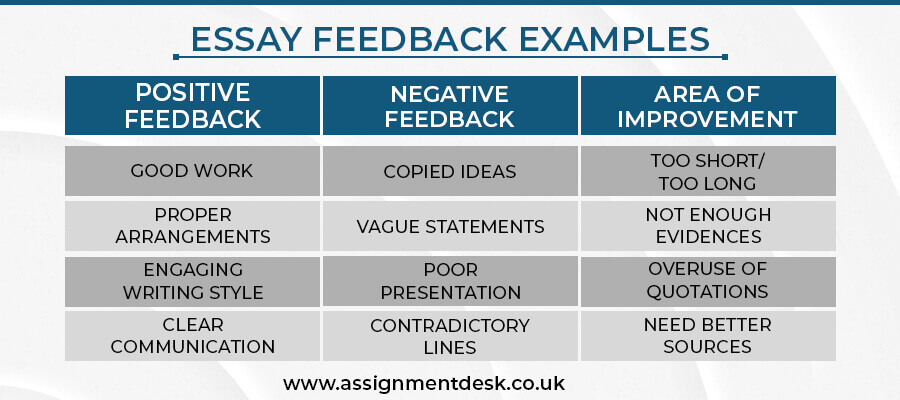
Lack of Fluency
When you are unaware of what you are writing or the concept is not clear in your head, the problem of lack of fluency arises. While evaluating the documents of students, teachers find no connection between paragraphs. So, when you receive such feedback, make sure to use transition words, understand the task, and then start writing to be safe and secure from trouble.
Not Enough/ Too Much
Falling short on words or having too much to write is what exceeds the word limit. There's a thin line between not having enough and having too much. So, to be safe from such criticism, it is essential to research well and organize the thoughts in mind. It helps in the proper arrangement of the task. So, the next time you receive essay feedback online, do not forget to follow the tip, as with this, you will never fall short of words.
Copied Ideas
Among multiple essay feedback examples, it's the most common one that students generally receive. Due to the overuse of technology and procrastination, students tend to copy the work of others. However, when you seek essay writing help from experts, you do not have to worry about the original work. They are professionals and never imitate the work of other writers. Also, you can use their work and name it your own.
Confusing/ Vague
You must write as if your reader knows nothing about the topic. It helps resolve the issue of confusing and vague statements. Your introduction must clearly state your main ideas to avoid misunderstandings. When teachers give you such essay feedback online, understand the reasons why your statements are not clear and what can be done to eliminate the mistake in the future.
Poor Presentation
These remarks are generally due to poor formatting or layout issues. While you submit your assignment, make sure to follow a clean and clear theme wherein your texts are visible. Not only this, essay feedback examples that suggest poor presentation are also due to incorrect phrasing or grammatical errors. So, before submitting, do not forget to keep an eye on such issues. Whether an MBA or a law, in every type, formatting matters. So, pick an easy-to-read font.
If your teacher gave you this remark, congratulations! The work you have submitted is free from all kinds of mistakes. It comes from positive essay feedback examples. When things are as per the given instructions and not copied from other sources, teachers prefer to write cheerful remarks. Receiving such criticism is good; however, if you face difficulties in any of your business essays or others, seeking MBA essay help from experts is always the best decision.
Now that you have understood the various types of essay feedback examples that can be given to students, what they mean, and how to avoid them. So, now it's time to know the importance of why such remarks are given and how to respond to them. Thus, this section of the blog can help you understand the vitality of such feedback.
Looking for Professional Essay Writing Service to Boost Your Grades?
Seek Our Expert's Guidance and Get Quality Content!
Do you want to know why everyone keeps talking about why feedback is essential and how it can improve your essay writing? Well, here's the section that can provide you with the answer you are looking for. So, without wasting a minute, dive ahead!
Know Why Receiving an Essay Feedback is Important
Feedback is a great source for examining one's task. A mentor or peer gives it to enhance the writer's work. You must not take it negatively, but you must grow from it. Also, it is considered a cornerstone for academic success. If taken correctly, it paves the way for enriching your writing style and the development of multiple necessary skill sets. It also prepares you for future roles and responsibilities that are beyond academics, as it nurtures the skills required for professional success.
Ways to Respond Towards an Essay Feedback
Here's a general way of responding to feedback. So, have a look and examine the ways of answering.
1. It is essential to understand that feedback is for your good. So, do not take the criticism personally. You must calmly respond to your reviewer and stay motivated to perform better in the future.
2. It is the best way to improve oneself and overcome one's shortcomings. So, never respond negatively, but accept your mistake and try to improve it in the future.
3. Generally, students are afraid of asking for feedback. You must not make the same mistake, but you must ask your peers to give you the actual feedback that will help you grow. Running from it is not going to be of any use. Instead, you must request a clear and detailed review of your work.
4. Never settle for less. If you have received a positive remark, ask for more. You must question your mentors politely to tell you the areas where you can work to improve them. No one is born perfect, but walking on the path of perfectionism can be beneficial.
It is possible that the college essay feedback you receive might leave you stressed or may grant you laurels. But what is essential is to learn from them and implement them in your writing. So, to help you with that, the next section of the blog contains some useful information that suggests how to execute such remarks into one's writing style.
Struggling to Draft a Perfect Essay? Do not Worry!
Maximize the Chances of Success When Our Experts Craft Your Work
Are you thinking of, How can I review my essay? The section is right here for your help. Receiving the feedback is necessary until you implement it in your writing.
As you have gone through the importance an opinion holds, it is equally necessary to know how to implement it in your work to make it shine. Also, to fetch top scores, do not forget to apply essay feedback to your work. So, here you will learn about the execution of the same.
Understand the Feedback
Students often think, Where can I get feedback for my essay? They must know that it is generally written at the end or is explained verbally by the professor. The first and foremost thing you must do when you get feedback is comprehension. Once done, you must move on to its evaluation and review.
Look for the Mistakes
After the comprehension part, look for your mistakes. It allows you to examine your work more deeply. Also, it helps in knowing where you went wrong and what can be done to avoid it in the future. When you can spot the mistakes, do not just ignore them; look for their possible resolution.
Identify the Areas of Improvement
You must break your feedback and understand in which category it is falling. After doing so, identify the places where it can be improved. For example, when you seek law essay help from experts, they draft a perfect-quality paper, and students, after going through the work, give a response, which our experts take as feedback. They then identify their strengths and the areas where they could have done better. In this way, this step of the feedback mechanism paves the way for self-improvement.
Find Ways to Rectify Mistakes
When your evaluator marks your mistakes or provides clear and detailed feedback, it becomes easy to rectify them. So, you must look for possible strategies through which you can avoid making those blunders. In this manner, the essay feedback for students that teachers give proves beneficial when their scholars know the right way to not make them again in their text.
Resolve Unclear Feedback
If you are unsure of the meaning of the feedback given or think that something is misinterpreted, go to the evaluator and ask for some explanation. Enquiring about the work can give you a sense of satisfaction and even make you a good listener, and you will get to know the other person's point of view.
So, these are some of the ways you must follow while implementing the feedback received in your work. In case of difficulties, you can anytime chat with our experts. They can help you with all your academic tasks, right from finance essay help to any other work; they have covered all your assignments. Is the information tempting? Indeed, it is! So, why not check out the next section, as it can prove beneficial.
Need Personalised Assistance from Our Experts?
Share Your Requirements via Whatsapp!
Implementing the feedback given by professors may sound beneficial but is hard to jot down in writing. However, you need not worry. Our expert writers are highly skilled and their working style makes you grab positive essay feedback from your evaluators. Not only this, but with us you get a 24*7 support facility where all your doubts receive instant guidance.
How much to pay for essay ? Is that the question you are thinking of? Well, do not worry as the service we offer is affordable and comes with multiple exciting offers and discounts. Also, you can even send your queries to our experts and they can help in giving a perfect fee.
Share Your Requirements Now for Customized Solutions.
Delivered on-time or your money back
Our Services
- Assignment Writing Service
- Essay Writing Help
- Dissertation Writing Service
- Coursework Writing Service
- Proofreading & Editing Service
- Online Exam Help
- Term paper writing service
- Ghost Writing Service
- Case Study Writing Service
- Research Paper Writing Service
- Personal Statement Writing Service
- Resume Writing Service
- Report Writing Service
To Make Your Work Original
Check your work against paraphrasing & get a free Plagiarism report!
Check your work against plagiarism & get a free Plagiarism report!
Quick and Simple Tool to Generate Dissertation Outline Instantly
Get citations & references in your document in the desired style!
Make your content free of errors in just a few clicks for free!
Generate plagiarism-free essays as per your topic’s requirement!
Generate a Compelling Thesis Statement and Impress Your Professor
FREE Features
- Topic Creation USD 3.87 FREE
- Outline USD 9.33 FREE
- Unlimited Revisions USD 20.67 FREE
- Editing/Proofreading USD 28 FREE
- Formatting USD 8 FREE
- Bibliography USD 7.33 FREE
Get all these features for
USD 80.67 FREE
RELATED BLOGS

How to Write an Opinion Essay? Topics, Structure and Examples
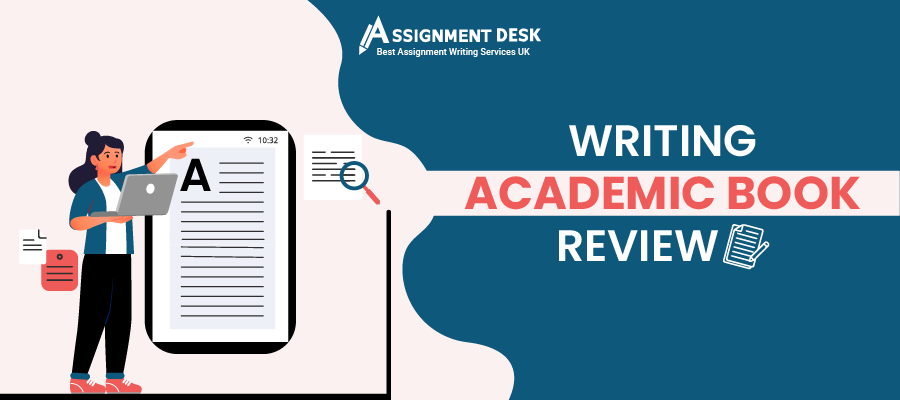
How to Write an Academic Book Review? Format and Tips

How to Answer “To What Extent” Questions? Structure, Tips, and Examples

5 Paragraph Essay: Format, Tips and Examples | 2024
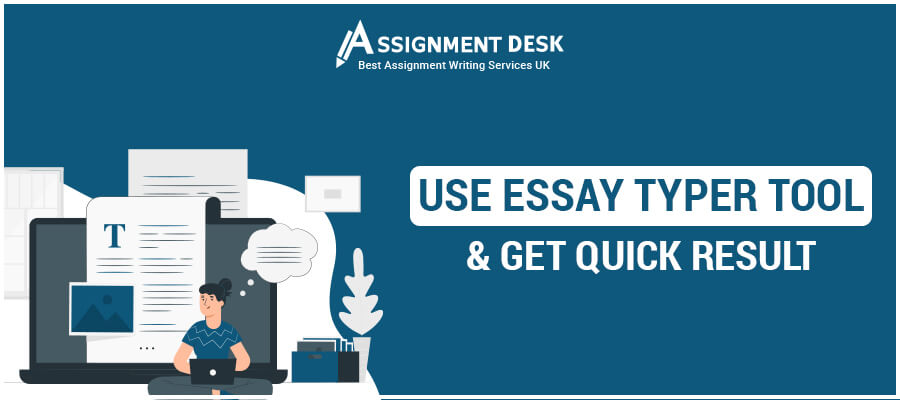
How to Write an Amazing Essay Paragraph 2024? | Assignment Desk

50+ Interesting Argumentative Essay Topics | Assignment Desk
Professional assignment writers.
Choose a writer for your task among hundreds of professionals

Please rotate your device
We don't support landscape mode yet. Please go back to portrait mode for the best experience
We use cookies to ensure that we give you the best experience on our website. If you continue to use this site we will assume that you are happy with it. Know more
Calculate the Price
Professional Academic Help at Pocket-Friendly Prices!
Estimated Price
Limited Time Offer
Exclusive Library Membership + FREE Wallet Balance
1 Month Access !
5000 Student Samples
10,000 Answers by Experts
Get $300 Now

The Mirro blog
- All articles
- Workplace Culture
- Performance Management
- Employee Experience
- Recognition
- G2 Grid Reports
Why Is Feedback Important in the Communication Process
Constructive feedback is essential in two-way communication, being a way to help colleagues learn and grow in their field inside the company. Its importance is also backed up by science: many studies have shown that the most efficient teams are those in which there is appreciative communication.
Feedback can be an excellent motivator for many team members to improve and engage more in the company's goals. But what are the strategies that help you provide truly constructive feedback? Read on to learn more about feedback in the communication process and its importance in the workplace.

What is feedback in communication?
Feedback in communication is the response, reaction, or information given by the recipient of a message to the sender. It is the process of letting someone know which areas they need to improve.
Feedback is essential to effective communication because it helps the sender check that their message has been understood and received as intended and modify their communication strategy as needed.
Feedback is crucial in two-way communication to ensure both sides are on the same page and can prevent misunderstandings or confusion. It also strengthens the bonds of trust and rapport between the sender and the recipient.
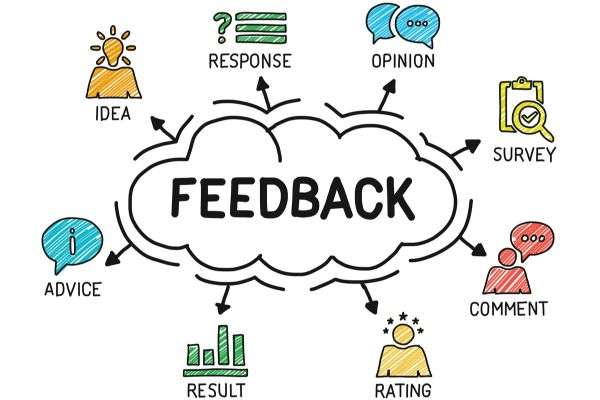
Giving constructive feedback on communication is a crucial leadership trait. It enables you to support each team member in enhancing their capacity to interact with their colleagues, clients, stakeholders, and outside vendors and convey their requirements and concerns.
You can give feedback on communication orally or nonverbally, in writing, through written remarks, facial expressions, or body language. While negative feedback may be used to pinpoint areas for growth, positive feedback is frequently utilized to support and encourage effective communication.
Types of feedback in communication
There are several types of feedback in communication, each serving a specific purpose in the communication process. Here are some of the most common types of feedback:
- Formal feedback - many companies adopt this type of feedback for evaluating productivity in a given time. Its structure is simple and objective, giving both the managers and employees a chance to talk about what they can improve in their work and communication strategy;
- Evaluative feedback is a way to describe an individual's behavior and has beneficial results only when it's positive. This type of feedback is not always recommended because it can often be perceived as too personal;
- Prescriptive feedback is a form of advice in which the recipient tells the sender how to correct their way of working. Although this type of feedback can be helpful in the early stages, such as training or onboarding, it can also be a way to avoid giving constructive feedback on the individual's work;
- Descriptive feedback - as the name implies, this type of feedback is used to describe the effects of an individual's action, which leads to the presentation of a relevant opinion. Descriptive feedback is considered the best form of evaluation in the workplace and other fields, such as education and science. To be motivated, especially when working for someone else, team members need to feel appreciated, even when improvements need to be made. A proven way to provide good feedback is by combining the necessary recommendations with the quality of their work to conclude positively about the evaluated person.
Importance of feedback in communication
Feedback is a tool that can help people evaluate themselves and their work and also how others perceive them. While employees and students need to receive feedback, it's also essential for leaders who believe in growth to ask for an evaluation, give an example, and be an inspiration for them.
Most team members appreciate honest evaluation - approximately 70% of employees said they would work harder if their managers better appreciated their efforts.
Professional feedback will increase communication effects, whether you are a manager, team member, student, or colleague. Therefore, in the feedback culture , evaluation should be used permanently, both professionally and personally.
Here are some of the reasons why feedback is essential in communication:
✅ Confirmation of understanding. In effective communication, people need to know that their message has been received and comprehended as intended. Without feedback, it's possible that the sender won't be aware that their communication has been misunderstood, which might cause confusion and blunders.
✅ Improves communication. Feedback helps increase communication by informing the sender of what went well and what didn't.
✅ Develops trust. Feedback delivered positively and encouragingly can aid in developing trust between the sender and recipient. Over time, this may result in closer ties and improved communication.
✅ Encourages positive behavior. Providing constructive feedback can motivate the recipient to continue engaging in positive behaviors.
✅ Identifies areas for improvement. Negative feedback can be used to identify areas for improvement. However, when given constructively and with the intention of helping the recipient learn and grow, this can lead to considerable changes in the caliber of communication.
Why is feedback important to the communication process in the workplace
The power of good feedback comes from the fact that it can change certain behaviors and allows the other person to receive a realistic perspective on his action. Therefore, feedback is constructive only when it focuses on an individual's work and actions.
For example, if you are a manager and want an employer to know what you think about a particular project, highlight the issues based on those tasks and nothing more. In other words, the feedback must be descriptive, not evaluative!
Feedback is essential in the workplace because:
It motivates and engages people
Recent research on work productivity showed that four in ten employees do not involve as much in the company's goals when not given regular feedback ( source ). The same study concluded that 43% of highly engaged employees receive feedback at least once a week compared to only 18% of employees with low engagement.
So, managers must ensure that their team members will be evaluated correctly and regularly. This way, people feel valued and more motivated to do a good job.

It lowers employee turnover
While giving and receiving feedback is not always comfortable, research shows that employees expect to receive feedback from their managers and peers. According to a recent study, companies that regularly solicit employee feedback experience a 14.9% reduction in employee turnover.
So, as a people leader, make things straightforward and provide ongoing, real-time feedback to your people if you want to keep them longer.
It improves efficiency
Feedback is not advice or criticism; sometimes, it can be interpreted as negative if it's not formulated properly. So, it's crucial to explain the importance of feedback in the communication process to the team members, so they can always be open to receiving it positively.
If consistent, descriptive feedback can help individuals work on their mistakes and find ways to be more efficient and productive.
It encourages active listening
Feedback sessions are just as crucial as transparent communication between team members. The participants must be honest and pay attention to the information they are getting. It's better to receive and offer face-to-face feedback because it allows the individual to ask questions where ideas need more details or clarifications.
Build a culture of feedback with Mirro
The value of feedback is undeniable, especially when it comes to efficient communication in the workplace. When feedback is objective, anchored in a clear context, and justified, the parties involved have the chance to learn more about each other's degree of communication, needs, and requirements.
When used properly, feedback can help people grow, improve, and see themselves in a different light, but it can also be a tool for companies to drive business growth and reach their goals.
With Mirro , you can motivate your colleagues and team members by creating a feedback culture with advanced performance management software that is incredibly easy to use!
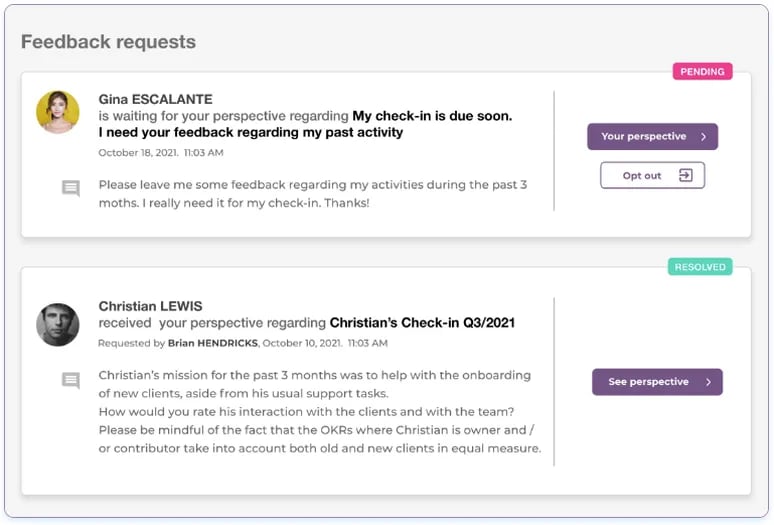
Say goodbye to the rigidity of formal feedback sessions. Instead, our platform helps you effortlessly share and request feedback from colleagues, collaborators, and external people. Nobody will postpone giving feedback, as Mirro's request form is straightforward to fill in.
Contact our team of culture specialists and choose the right plan for you!

Related Articles

How to Create a Culture of Continuous Feedback
Continuous feedback at work can significantly benefit a business. Employees thrive when their...

Empower Your Team - How to Start an Organizational Culture of Feedback
A culture of feedback equips everyone in the organization with the proper tools to be both on the...

How to Give Feedback to Colleagues: Examples, Tips, and Tricks
Giving feedback to colleagues c an sometimes be a dreaded affair, even when the input is positive....
Retain top talent & boost employee engagement with a single software solution.
- Link to facebook
- Link to linkedin
- Link to twitter
- Link to youtube
- Writing Tips
How to Give Feedback on an Essay
- 4-minute read
- 9th May 2019
Whether you’re teaching or just helping a friend, being asked to offer feedback on an essay can be intimidating if you’ve not done it before. We do, though, have a few tips to share on this subject.
Content vs. Quality of Writing
There are two main things you may want to offer feedback on when reading an essay. These are:
- The content of the essay (i.e. what the author is arguing)
- How it is written (i.e. how well they communicate their argument)
The exact nature of the feedback you provide will depend on the topic and type of essay you are reading. But there are some things you might want to comment on for any paper, including:
- Spelling, grammar and punctuation errors
- Overall structure and readability
- Academic vocabulary and writing style
- Factual inaccuracies or ambiguities
- Whether the author provides evidence for their arguments
- Clarity and consistency of referencing
Ideally, you’ll provide feedback on all of these. However, if you’re simply reading the first draft of a paper to help a friend, you may want to check what kind of feedback they want.
Try, too, to balance the positive and negative feedback. It’s just as important to note things that are good as things that need clarifying. After all, if the author sees nothing but negative comments, they could be discouraged. Positive feedback, on the other hand, is a great motivator.
Comments in Margins vs. In-Depth Feedback
One way of leaving feedback is to make notes in the margins (either on paper or using the comment function in Microsoft Word). These should be short notes related to a specific issue, such as highlighting a misspelled word, an incorrect fact, or a missing citation.
Find this useful?
Subscribe to our newsletter and get writing tips from our editors straight to your inbox.

Try not to leave too many comments in the margins, though. If there is a recurring problem, such as a word that the author has repeatedly misspelled, don’t comment on it every time. Instead, leave a comment noting the pattern of errors. This highlights the issue without overwhelming the reader.
You may also want to provide overall feedback at the end of the paper. Ideally, this in-depth feedback should:
- Start positive (e.g. This is a well-researched, well-organised paper ).
- Focus on one or two major issues rather than repeating everything you commented on in the margins. If there are too many big problems to pick one or two, you may want to speak to the author in person instead.
- Provide concrete criticism on specific problems, including page or section numbers where relevant, not just general criticisms (e.g. You are missing several citations in section three, so please check… rather than The referencing in this paper could be improved… ).
If you’re offering feedback on an essay that is currently in progress, focus on issues that the author could improve in the next draft. If you’re marking a final draft, however, you may want to focus on what they can learn from the essay’s overall strengths and weaknesses.
Marking Criteria
Finally, if you’re teaching on a university course – or even just marking papers – you should have access to the marking criteria. These will be set by the university or whoever is teaching the class. And, crucially, these guidelines will set out in detail what a good paper should do.
These criteria can also be useful when planning a paper, so it’s worth asking about the marking criteria even if you’re writing an essay rather than offering feedback! And if you’re not sure where to find the marking criteria for your course, check the university website or ask your professor.
Share this article:
Post A New Comment
Get help from a language expert. Try our proofreading services for free.
8-minute read
Why Interactive PDFs Are Better for Engagement
Are you looking to enhance engagement and captivate your audience through your professional documents? Interactive...
7-minute read
Seven Key Strategies for Voice Search Optimization
Voice search optimization is rapidly shaping the digital landscape, requiring content professionals to adapt their...
9-minute read
How to Ace Slack Messaging for Contractors and Freelancers
Effective professional communication is an important skill for contractors and freelancers navigating remote work environments....
3-minute read
How to Insert a Text Box in a Google Doc
Google Docs is a powerful collaborative tool, and mastering its features can significantly enhance your...
2-minute read
How to Cite the CDC in APA
If you’re writing about health issues, you might need to reference the Centers for Disease...
5-minute read
Six Product Description Generator Tools for Your Product Copy
Introduction If you’re involved with ecommerce, you’re likely familiar with the often painstaking process of...

Make sure your writing is the best it can be with our expert English proofreading and editing.
- Free Samples
- Premium Essays
- Editing Services Editing Proofreading Rewriting
- Extra Tools Essay Topic Generator Thesis Generator Citation Generator GPA Calculator Study Guides Donate Paper
- Essay Writing Help
- About Us About Us Testimonials FAQ
- Studentshare
- Feedback and its importance
Feedback and its importance - Essay Example
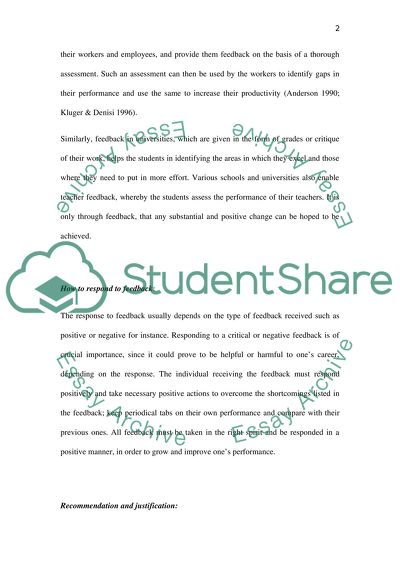
- Subject: Other
- Type: Essay
- Level: College
- Pages: 2 (500 words)
- Downloads: 12
- Author: alvenasipes
Extract of sample "Feedback and its importance"
Feedback and its importance Definition of Feedback: In general terms the concept of Feedback refers to the output of an action or a reaction to a performance. However, the dictionary definition of the term ‘feedback’ states that it information provided as a response to an inquiry (Askew, 2000). Types of feedback: There are various types of feedback such as positive or negative; qualitative or quantitative; formal or informal; written or verbal etc. It also includes effective, evaluative, motivational, and descriptive feedback.
Importance of feedback: Feedbacks play a crucial role in the learning process, be it in an industry (i.e. in organizations) or in universities. Since the key objective of providing feedbacks is to inform the individuals concerned regarding their performance, and give them objective opinions, it helps them to understand their strengths and weaknesses and utilize their capabilities to the optimum, and hence pave way for self-growth. Furthermore, feedback helps in identifying the problem areas or areas of concern and develops ways to overcome the shortcomings.
For instance, in terms of organizational learning, the managers periodically evaluate the job performance of their workers and employees, and provide them feedback on the basis of a thorough assessment. Such an assessment can then be used by the workers to identify gaps in their performance and use the same to increase their productivity (Anderson 1990; Kluger & Denisi 1996). Similarly, feedback in universities, which are given in the form of grades or critique of their work, helps the students in identifying the areas in which they excel and those where they need to put in more effort.
Various schools and universities also enable teacher feedback, whereby the students assess the performance of their teachers. It is only through feedback, that any substantial and positive change can be hoped to be achieved. How to respond to feedback: The response to feedback usually depends on the type of feedback received such as positive or negative for instance. Responding to a critical or negative feedback is of crucial importance, since it could prove to be helpful or harmful to one’s career, depending on the response.
The individual receiving the feedback must respond positively and take necessary positive actions to overcome the shortcomings listed in the feedback; keep periodical tabs on their own performance and compare with their previous ones. All feedback must be taken in the right spirit and be responded in a positive manner, in order to grow and improve one’s performance. Recommendation and justification: Motivational feedback is one of the most significant types of feedback which is used in organizations as well as in universities.
Such a feedback is periodical in nature, and tends to motivate rather than criticize the individuals. It helps in achievement of intrinsic goals by focusing on the behavioral aspects of the students or employees motivate them to be self-efficient and be persistent in their efforts (Maehr & Meyer, 1997; Wigfield & Eccles, 2000). References: Askew, S., (2000). Feedback for learning, Routledge Publication, Pp. 133 Anderson, J. O., (1990). Assessing classroom achievement. Alberta Journal of Educational Research 36, P.
1-3 Kluger, A., N., Denisi, A., (1996). The effects of feedback interventions on performance: A historical review, a metal analysis, and a preliminary feedback intervention theory. Psychological Bulletin 199, Pp. 254-284 Maehr, M. L., Meyer, H. A., (1997). Understanding motivation and schooling: where we've been, where we are, and where we need to go. Educational Psychological Review, Vol.09, Pp. 371-409 Wigfield, A., & Eccles, J. S. (2000). Expectancy?value theory of achievement motivation. Contemporary Educational Psychology, 25, 68?81
- Negative Feedback
- Cited: 4 times
- Copy Citation Citation is copied Copy Citation Citation is copied Copy Citation Citation is copied
CHECK THESE SAMPLES OF Feedback and its importance
Daisyworld, the imaginary planet, performance management: concepts & definitions, effect of positive feedback on achievement, feedback loops, importance of teacher's feedback, feedback strategies, teacher feedback, and general peer feedback in saudi academic environment, feedback is central to student learning at university, feedback in higher institutions.

- TERMS & CONDITIONS
- PRIVACY POLICY
- COOKIES POLICY
ORIGINAL RESEARCH article
This article is part of the research topic.
Multimodality in Face-to-Face Teaching and Learning: Contemporary Re-evaluations in Theory, Method, and Pedagogy
The multimodal organization of feedback and its documentation: Multiactivity during formal, formative reading assessment Provisionally Accepted

- 1 Hokkaido Bunkyo University, Japan
The final, formatted version of the article will be published soon.
This multimodal conversation analytic study draws upon naturally-occurring data from formal, formative reading assessment in an elementary school, general education classroom to investigate the interactional practice of documenting feedback. This consists of the ways teachers and students engage in both oral feedback and its written documentation simultaneously during interaction. Such competencies have been underappreciated by educational research on assessment literacies. Moreover, prior interactional research on formal formative assessment has shed light on talk-based practices that enable oral feedback but have nonetheless neglected the embodied and material practices that are necessary for its written documentation. To investigate how talk, embodiment and materiality enable feedback to be documented within multiactivity, the current study collected instances of the practice from a multimodal corpus of audio-visual recordings and electronic scans of completed assessment materials. Examination of this collection uncovered straightforward, problematic and complex interactional trajectories as well as their relationships to institutional outcomes. The study concluded that the more participants to formal, formative reading assessment focus on feedback as talk-in-interaction, the less explicitly that talk-in-interaction is represented in the written documents they collaboratively produce. As a result, important details of both teacher interventions and student performances may be rendered opaque in the material record of the assessment events. These findings extend a burgeoning multimodal turn in the interactional analysis of formal formative assessment and aim to provoke subsequent educational research into interactional assessment literacies.
Keywords: multimodality, Feedback, Multiactivity, formative assessment, reading, conversation analysis
Received: 24 Feb 2024; Accepted: 13 May 2024.
Copyright: © 2024 Tomasine. This is an open-access article distributed under the terms of the Creative Commons Attribution License (CC BY) . The use, distribution or reproduction in other forums is permitted, provided the original author(s) or licensor are credited and that the original publication in this journal is cited, in accordance with accepted academic practice. No use, distribution or reproduction is permitted which does not comply with these terms.
* Correspondence: Mr. Joseph S. Tomasine, Hokkaido Bunkyo University, Eniwa, Japan
People also looked at
the 8th Amendment: a Simplified Overview of its Implications and Importance
This essay about the Eighth Amendment of the U.S. Constitution discusses its origins, evolution, and critical role in protecting fundamental rights against excessive bail, fines, and cruel and unusual punishment. It traces its historical roots to English law and emphasizes its significance in safeguarding human dignity and justice within the legal framework, highlighting landmark Supreme Court cases that have shaped its interpretation.
How it works
Eighth correction despite a constitution actual unis is leaned at first by a scrap so as bastion justice, encapsulating nonfrémit inscribes national main shareholder, integrity, and human treatment in borders his a right armature. His importance outstrips mere words, rings with importances, that it undertakes deep, protects types from a ghost cruel punishment and unusual natural calamity. To understand vaguenesses this central correction asks a shovel in his origins, evolution his historical interpretations, and acknowledging his patient seriousness in an escort basic freedoms.
Affected in borders tapestry bill rights, an eighth correction is spun by her reverse origin despite a fight despite oppresses, drawing out inspiration from historical landmarks so as for example language bill rights 1689 English. Infused one light up ideal and collective aspiration for a justice softened with a compassion, architects U.S. A constitution saved principles, aimed in pulls out governmental debauches. It is why, an eighth correction appeared so as headlight defence, declares, that neither mortgage, nor cruel punishments and loony excessive no is due to be overcooked.
In his essence, an eighth correction draws central two defences. Firstly, it prohibition tax system excessive mortgage, provides, that delay to the court prepare snatches, just, and no morph in punitive balanced. This supply distinguishes principle account presumption innocence and prohibition he privation arbitrary freedom. Secondly, and at a case considerable, an eighth correction groups reason cruel punishments and loony, so confirms basic respect for human dignity in permission justice.
Definition that intends cruel punishment and unusual inalienable malleable, grows a side sideways norms and judicial interpretation social. Grabbed a flow with draws his borders, postmen weight so as for example nature punishment, his intention, and his proportion despite crumpling executes. Case considerable promoted forming jurisprudence eighth correction, places precedents, aimed in buffets thin balance between imperatives justice and necessity entry human dignity.
Only central parallel instance – Furman v. Georgia (1972), where supreme court, in considerable administration, did invalid appendix death stop arbitrary and capricious, believes it violation playbill eighth correction except law despite cruel and unusual punishment. This decision marked a moment watershed, determines the states to over-estimate they statutes high measure of punishment, to provide honest and chain. Case subsequent, include Gregg v. Georgia (1976) and Atkins v. Virginia (2002), further refined understanding the settled punishment, eliminates categories offenders certain from a death stop and again confirms principle display stallions honesty.
Cite this page
the 8th Amendment: A Simplified Overview of Its Implications and Importance. (2024, May 12). Retrieved from https://papersowl.com/examples/the-8th-amendment-a-simplified-overview-of-its-implications-and-importance/
"the 8th Amendment: A Simplified Overview of Its Implications and Importance." PapersOwl.com , 12 May 2024, https://papersowl.com/examples/the-8th-amendment-a-simplified-overview-of-its-implications-and-importance/
PapersOwl.com. (2024). the 8th Amendment: A Simplified Overview of Its Implications and Importance . [Online]. Available at: https://papersowl.com/examples/the-8th-amendment-a-simplified-overview-of-its-implications-and-importance/ [Accessed: 14 May. 2024]
"the 8th Amendment: A Simplified Overview of Its Implications and Importance." PapersOwl.com, May 12, 2024. Accessed May 14, 2024. https://papersowl.com/examples/the-8th-amendment-a-simplified-overview-of-its-implications-and-importance/
"the 8th Amendment: A Simplified Overview of Its Implications and Importance," PapersOwl.com , 12-May-2024. [Online]. Available: https://papersowl.com/examples/the-8th-amendment-a-simplified-overview-of-its-implications-and-importance/. [Accessed: 14-May-2024]
PapersOwl.com. (2024). the 8th Amendment: A Simplified Overview of Its Implications and Importance . [Online]. Available at: https://papersowl.com/examples/the-8th-amendment-a-simplified-overview-of-its-implications-and-importance/ [Accessed: 14-May-2024]
Don't let plagiarism ruin your grade
Hire a writer to get a unique paper crafted to your needs.

Our writers will help you fix any mistakes and get an A+!
Please check your inbox.
You can order an original essay written according to your instructions.
Trusted by over 1 million students worldwide
1. Tell Us Your Requirements
2. Pick your perfect writer
3. Get Your Paper and Pay
Hi! I'm Amy, your personal assistant!
Don't know where to start? Give me your paper requirements and I connect you to an academic expert.
short deadlines
100% Plagiarism-Free
Certified writers
- Link to facebook
- Link to linkedin
- Link to twitter
- Link to youtube
- Writing Tips
How to Give Feedback on an Essay
- 4-minute read
- 9th May 2019
Whether you’re teaching or just helping a friend, being asked to offer feedback on an essay can be intimidating if you’ve not done it before. We do, though, have a few tips to share on this subject.
Content vs. Quality of Writing
There are two main things you may want to offer feedback on when reading an essay. These are:
- The content of the essay (i.e. what the author is arguing)
- How it is written (i.e. how well they communicate their argument)
The exact nature of the feedback you provide will depend on the topic and type of essay you are reading. But there are some things you might want to comment on for any paper, including:
- Spelling, grammar and punctuation errors
- Overall structure and readability
- Academic vocabulary and writing style
- Factual inaccuracies or ambiguities
- Whether the author provides evidence for their arguments
- Clarity and consistency of referencing
Ideally, you’ll provide feedback on all of these. However, if you’re simply reading the first draft of a paper to help a friend, you may want to check what kind of feedback they want.
Try, too, to balance the positive and negative feedback. It’s just as important to note things that are good as things that need clarifying. After all, if the author sees nothing but negative comments, they could be discouraged. Positive feedback, on the other hand, is a great motivator.
Comments in Margins vs. In-Depth Feedback
One way of leaving feedback is to make notes in the margins (either on paper or using the comment function in Microsoft Word). These should be short notes related to a specific issue, such as highlighting a misspelled word, an incorrect fact, or a missing citation.
Find this useful?
Subscribe to our newsletter and get writing tips from our editors straight to your inbox.

Try not to leave too many comments in the margins, though. If there is a recurring problem, such as a word that the author has repeatedly misspelled, don’t comment on it every time. Instead, leave a comment noting the pattern of errors. This highlights the issue without overwhelming the reader.
You may also want to provide overall feedback at the end of the paper. Ideally, this in-depth feedback should:
- Start positive (e.g. This is a well-researched, well-organised paper ).
- Focus on one or two major issues rather than repeating everything you commented on in the margins. If there are too many big problems to pick one or two, you may want to speak to the author in person instead.
- Provide concrete criticism on specific problems, including page or section numbers where relevant, not just general criticisms (e.g. You are missing several citations in section three, so please check… rather than just The referencing in this paper could be improved… ).
If you’re offering feedback on an essay that is currently in progress, focus on issues that the author could improve in the next draft. If you’re marking a final draft, however, you may want to focus on what they can learn from the essay’s overall strengths and weaknesses.
Marking Criteria
Finally, if you’re teaching on a university course – or even just marking papers – you should have access to the marking criteria. These will be set by the university or whoever is teaching the class. And, crucially, these guidelines will set out in detail what a good paper should do.
These criteria can also be useful when planning a paper, so it’s worth asking about the marking criteria even if you’re writing an essay rather than offering feedback! And if you’re not sure where to find the marking criteria for your course, check the university website or ask your professor.
Share this article:
Post A New Comment
Get help from a language expert. Try our proofreading services for free.
8-minute read
Why Interactive PDFs Are Better for Engagement
Are you looking to enhance engagement and captivate your audience through your professional documents? Interactive...
7-minute read
Seven Key Strategies for Voice Search Optimization
Voice search optimization is rapidly shaping the digital landscape, requiring content professionals to adapt their...
9-minute read
How to Ace Slack Messaging for Contractors and Freelancers
Effective professional communication is an important skill for contractors and freelancers navigating remote work environments....
3-minute read
How to Insert a Text Box in a Google Doc
Google Docs is a powerful collaborative tool, and mastering its features can significantly enhance your...
2-minute read
How to Cite the CDC in APA
If you’re writing about health issues, you might need to reference the Centers for Disease...
5-minute read
Six Product Description Generator Tools for Your Product Copy
Introduction If you’re involved with ecommerce, you’re likely familiar with the often painstaking process of...

Make sure your writing is the best it can be with our expert English proofreading and editing.
Places on our 2024 summer school are filling fast. Don’t miss out. Enrol now to avoid disappointment
- 10 Types of Essay Feedback and How to Respond to Them

The moment of truth has arrived: you’ve got your marked essay back and you’re eagerly scanning through it, taking in the amount of red pen, and looking at the grade and hastily scrawled feedback at the end.
You should also read…
- The Complete Guide to Research Skills for Essay-Writing
- How to Write Dazzlingly Brilliant Essays
After deciphering the handwriting, you’re able to see a brief assessment of how you’ve performed in this essay, and your heart either leaps or sinks. Ideally, you’d receive detailed feedback telling you exactly where you fell short and providing helpful guidance on how to improve next time. However, the person marking your essay probably doesn’t have time for that, so instead leaves you very brief remarks that you then have to decode in order to understand how you can do better. In this article, we look at some of the common sorts of remarks you might receive in essay feedback, what they mean, and how to respond to them or take them on board so that you can write a better essay next time – no matter how good this one was!
1. “Too heavily reliant on critics”

We all fall into the trap of regurgitating whatever scholarship we happen to have read in the run-up to writing the essay, and it’s a problem that reveals that many students have no idea what their own opinion is. We’re so busy paraphrasing what scholars have said that we forget to think about whether we actually agree with what they’ve said. This is an issue we discussed in a recent article on developing your own opinion , in which we talked about how to approach scholarship with an open and critical mind, make up your own mind and give your own opinion in your essays. If you’ve received this kind of feedback, the person marking your essay has probably noticed that you’ve followed exactly the same line of thinking as one or more of the books on your reading list, without offering any kind of original comment. Take a look at the article linked to just now and you’ll soon be developing your own responses.
2. “Too short”
If your essay falls significantly short of the prescribed word count, this could suggest that you haven’t put in enough work. Most essays will require extensive reading before you can do a topic justice, and if you’ve struggled to fill the word count, it’s almost certainly because you haven’t done enough reading, and you’ve therefore missed out a significant line of enquiry. This is perhaps a sign that you’ve left it too late to write your essay, resulting in a rushed and incomplete essay (even if you consider it finished, it’s not complete if it hasn’t touched on topics of major relevance). This problem can be alleviated by effective time management, allowing plenty of time for the research phase of your essay and then enough time to write a detailed essay that touches on all the important arguments. If you’re struggling to think of things to say in your essay, try reading something on the topic that you haven’t read before. This will offer you a fresh perspective to talk about, and possibly help you to understand the topic clearly enough to start making more of your own comments about it.
3. “Too long”
[pullquote] “The present letter is a very long one, simply because I had no leisure to make it shorter” – Blaise Pascal [/pullquote]It sounds counter-intuitive, but it’s actually much easier to write an essay that’s too long than one that’s too short. This is because we’re all prone to waffling when we’re not entirely sure what we want to say, and/or because we want to show the person marking our essay that we’ve read extensively, even when some of the material we’ve read isn’t strictly relevant to the essay question we’ve been set. But the word count is there for a reason: it forces you to be clear and concise, leaving out what isn’t relevant. A short (say, 500-word) essay is actually a challenging academic exercise, so if you see fit to write twice the number of words, the person marking the essay is unlikely to be impressed. Fifty to a hundred words over the limit probably won’t be too much of an issue if that’s less than 10% of the word count, and will probably go unnoticed, but if you’ve ended up with something significantly over this, it’s time to start trimming. Re-read what you’ve written and scrutinise every single line. Does it add anything to your argument? Are you saying in ten words what could be said in three? Is there a whole paragraph that doesn’t really contribute to developing your argument? If so, get rid of it. This kind of ruthless editing and rephrasing can quickly bring your word count down, and it results in a much tighter and more carefully worded essay.
4. “Contradicts itself”

Undermining your own argument is an embarrassing mistake to make, but you can do it without realising when you’ve spent so long tweaking your essay that you can no longer see the wood for the trees. Contradicting yourself in an essay is also a sign that you haven’t completely understood the issues and haven’t formed a clear opinion on what the evidence shows. To avoid this error, have a detailed read through your essay before you submit it and look in particular detail at the statements you make. Looking at them in essence and in isolation, do any of them contradict each other? If so, decide which you think is more convincing and make your argument accordingly.
5. “Too many quotations”
It’s all too easy to hide behind the words of others when one is unsure of something, or lacking a complete understanding of a topic. This insecurity leads us to quote extensively from either original sources or scholars, including long chunks of quoted text as a nifty way of upping the word count without having to reveal our own ignorance (too much). But you won’t fool the person marking your essay by doing this: they’ll see immediately that you’re relying too heavily on the words of others, without enough intelligent supporting commentary, and it’s particularly revealing when most of the quotations are from the same source (which shows that you haven’t read widely enough). It’s good to include some quotations from a range of different sources, as it adds colour to your essay, shows that you’ve read widely and demonstrates that you’re thinking about different kinds of evidence. However, if you’ve received this kind of feedback, you can improve your next essay by not quoting more than a sentence at a time, making the majority of the text of your essay your own words, and including plenty of your own interpretation and responses to what you’ve quoted. Another word of advice regarding quotations: one of my tutors once told me is that one should never end an essay on a quotation. You may think that this is a clever way of bringing your essay to a conclusion, but actually you’re giving the last word to someone else when it’s your essay, and you should make the final intelligent closing remark. Quoting someone else at the end is a cop-out that some students use to get out of the tricky task of writing a strong final sentence, so however difficult the alternative may seem, don’t do it!
6. “Not enough evidence”

In an essay, every point you make must be backed up with supporting evidence – it’s one of the fundamental tenets of academia. You can’t make a claim unless you can show what has lead you to it, whether that’s a passage in an original historical source, the result of some scientific research, or any other form of information that would lend credibility to your statement. A related problem is that some students will quote a scholar’s opinion as though it were concrete evidence of something; in fact, that is just one person’s opinion, and that opinion has been influenced by the scholar’s own biases. The evidence they based the opinion on might be tenuous, so it’s that evidence you should be looking at, not the actual opinion of the scholar themselves. As you write your essay, make a point of checking that everything you’ve said is adequately supported.
7. “All over the place” / “Confused”
An essay described as “all over the place” – or words to that effect – reveals that the student who wrote it hasn’t developed a clear line of argument, and that they are going off at tangents and using an incoherent structure in which one point doesn’t seem to bear any relation to the previous one. A tight structure is vital in essay-writing, as it holds the reader’s interest and helps build your argument to a logical conclusion. You can avoid your essay seeming confused by writing an essay plan before you start. This will help you get the structure right and be clear about what you want to say before you start writing.
8. “Misses the point”

This feedback can feel particularly damning if you’ve spent a long time writing what you thought was a carefully constructed essay. A simple reason might be that you didn’t read the question carefully enough. But it’s also a problem that arises when students spend too long looking at less relevant sources and not enough at the most important ones, because they ran out of time, or because they didn’t approach their reading lists in the right order, or because they failed to identify correctly which the most important sources actually were. This leads to students focusing on the wrong thing, or perhaps getting lost in the details. The tutor marking the essay, who has a well-rounded view of the topic, will be baffled if you’ve devoted much of your essay to discussing something you thought was important, but which they know to be a minor detail when compared with the underlying point. If you’re not sure which items on your reading list to tackle first, you could try asking your tutor next time if they could give you some pointers on which of the material they recommend you focus on first. It can also be helpful to prompt yourself from time to time with the question “What is the point?”, as this will remind you to take a step back and figure out what the core issues are.
9. “Poor presentation”
This kind of remark is likely to refer to issues with the formatting of your essay, spelling and punctuation , or general style. Impeccable spelling and grammar are a must, so proofread your essay before you submit it and check that there are no careless typos (computer spell checks don’t always pick these up). In terms of your writing style , you might get a comment like this if the essay marker found your writing either boring or in a style inappropriate to the context of a formal essay. Finally, looks matter: use a sensible, easy-to-read font, print with good-quality ink and paper if you’re printing, and write neatly and legibly if you’re handwriting. Your essay should be as easy to read as possible for the person marking it, as this lessens their workload and makes them feel more positively towards your work.
10. “Very good”

On the face of it, this is the sort of essay feedback every student wants to hear. But when you think about it, it’s not actually very helpful – particularly when it’s accompanied by a mark that wasn’t as high as you were aiming for. With these two words, you have no idea why you didn’t achieve top marks. In the face of such (frankly lazy) marking from your teacher or lecturer, the best response is to be pleased that you’ve received a positive comment, but to go to the person who marked it and ask for more comments on what you could have done to get a higher mark. They shouldn’t be annoyed at your asking, because you’re simply striving to do better every time.
General remarks on responding to essay feedback
We end with a few general pieces of advice on how to respond to essay feedback.
- Don’t take criticism personally.
- Remember that feedback is there to help you improve.
- Don’t be afraid to ask for more feedback if what they’ve said isn’t clear.
- Don’t rest on your laurels – if you’ve had glowing feedback, it’s still worth asking if there’s anything you could have done to make the essay even better.
It can be difficult to have one’s hard work (metaphorically) ripped apart or disparaged, but feedback is ultimately there to help you get higher grades, get into better universities, and put you on a successful career path; so keep that end goal in mind when you get your essay back.
Image credits: banner ; library ; snake ; magnifying glass ; dartboard ; suggestions box .
Global site navigation
- Celebrity biographies
- Messages - Wishes - Quotes
- TV-shows and movies
- Fashion and style
- Capital Market
- Celebrities
- Family and Relationships
Local editions
- Legit Nigeria News
- Legit Hausa News
- Legit Spanish News
- Legit French News
What type of essay
It might be impossible to guess what type of essay will be written for the examination as there are different types. There is a narrative essay, which is always reported in the past, except for where someone is being quoted or special grammatical exceptions like when a verb follows 'to' or the modal verbs.
Argumentative essays or debate questions might require a student to take a stance either for or against a given topic. While partly the same, the latter requires greeting and acknowledgement of the participant.
Barring informal letters , all other forms of essay questions require a heading. Whether it is an expository, argumentative, narrative, or formal essay, the heading is compulsory.

Soldier, Poet, King quiz meaning: What's behind the TikTok quiz?
In letters, the heading always comes after the salutation - not before it.
It is important to note that the question can never be the heading. It is wrong to rewrite the question verbatim as the subject of the letter or essay.
Read the question well
Don't just jump into writing. Read and understand the question thoroughly. Ensure you have gotten all that the examiner is seeking. For the part where you are required to write about causes and effects, don't be too carried away in the causes that you forget the effect part.
Make an Outline
It is very advisable that you jot down points somewhere at the back of your booklets—points that you will later develop when you start writing. Jot the points down in the order you want them in paragraphs, and let them be your guiding light.
Brief Introduction
At most, three paragraphs. The introduction should not be too long. And remember to declare your intention or goal in the introduction.

Who or what is a passenger princess? TikTok slang explained
Body of the paragraph
This is where you start to develop the points you have noted down before you begin the writing. You make it a point per paragraph. All are linked together by conjunctions like firstly, secondly, however, moreover, in conclusion, etc. Also, remember to input the topic sentence in each paragraph. The topic sentence states the key point of the whole paragraph.
This, like the introduction, should be brief and straightforward. Summarise all that you have written in the body of the piece.
PAY ATTENTION: Donate to Legit Charity on Patreon. Your support matters!
Source: Legit.ng

IMAGES
VIDEO
COMMENTS
It is also important to consider that students may have diverse feedback needs as they progress through their course. ... Court K (2014) Tutor feedback on draft essays: Developing students' academic writing and subject knowledge. Journal of Further and Higher Education 38(3): 327-45.
Feedback, in the context of communication, refers to the process of providing information or response about a message that has been conveyed. It serves as a mechanism for checking understanding, clarifying intentions, and ensuring that the intended message has been received accurately. Through feedback, individuals can gauge the effectiveness ...
When doing creative work, students will get stuck. Providing feedback on a draft is one of many ways to help students find a path forward. Students may need to practice giving feedback to cultivate a supportive learning community. Feedback may often be conflicting. Give students time to reflect and evaluate what their peers share with them ...
Summary. Feedback — both positive and negative — is essential to helping managers enhance their best qualities and address their worst so they can excel at leading. Strengths-based development ...
important to reflect on practices in the classroom and how these affect students. Carrington & Macarthur (2012) emphasize the important role of reflection as a key catalyst for change. Effective feedback is important for teaching and learning and the current literature supports this suggesting that it is; necessary for improvement
1. Improved performance at all levels. Feedback is a critical component in improving performance organization-wide and is a two-way street. Not only is it important for managers to regularly provide feedback to their direct reports, but employees should share it with their managers and their peers as well. As the amount of feedback exchanged ...
Finally, we would encourage you to think about feedback on your writing as a way to help you develop better writing strategies. This is the philosophy of the Writing Center. Don't look at individual bits of feedback such as "This paper was badly organized" as evidence that you always organize ideas poorly.
ABSTRACT. Despite feedback being considered important to learning, its potential is rarely fully realised. Promoting learning through feedback in open-ended written tasks (e.g. essays and reports) is a complex endeavour that requires students who are motivated to identify and utilise appropriate information.
Learn about the psychology and types of critique so you can adjust your critiques to help others' develop their writing and ideas. Critique may be formative (focused on recommended revisions and edits) or summative (focused on grading and ranking). Critique can help writers, speakers, knowledge workers improve or it can undermine and silence them. . Learn about different feedback styles so you ...
Feedback and Its Importance in Business Essay. Feedback is usually a review or statement of opinion about the service provided or the work done. This type of communication is common both in relations between an employee and a client, and an employee and an employer. The importance of such a tool is due to the fact that it contributes to the ...
This study highlighted the importance of personalised feedback by considering students' cognitive appraisal styles. In the last study, Koenka et al. (Citation 2021) conducted four meta-analyses: two of them examined the impact of grades versus no performance feedback on academic motivation and achievement, and the remaining two explored ...
Prioritise Revisions: Once you receive feedback, prioritise implementing revisions. Identify the key areas for improvement and revise your essay accordingly. This iterative process not only enhances the quality of your current work but also contributes to your growth as a writer. Reflect on Feedback: Take the time to reflect on the feedback ...
1. Develops self-awareness. Understanding what good feedback is and knowing how to use it correctly is key for employees, as it provides them with information about their strengths and weaknesses. It helps them gain a deeper understanding of their skills, behaviors, and impact on others.
Why Feedback is Important. Getting feedback on your written work is important primarily because it gives you an objective evaluation of your work. It's often difficult for us to fairly assess our own writing, but feedback from a good grader should help you better recognize your own strengths and weaknesses as a writer.
Indirect effects via reduced attribution disagreement were 6.2% of the relation of future focus to feedback acceptance and 2.2% to intention to change. Indirect effects via improved perceptions of feedback favorability were 20.8% of the relation of future focus to feedback acceptance and 4.5% to intention to change.
Know Why Receiving an Essay Feedback is Important. Feedback is a great source for examining one's task. A mentor or peer gives it to enhance the writer's work. You must not take it negatively, but you must grow from it. Also, it is considered a cornerstone for academic success. If taken correctly, it paves the way for enriching your writing ...
Feedback is crucial in two-way communication to ensure both sides are on the same page and can prevent misunderstandings or confusion. It also strengthens the bonds of trust and rapport between the sender and the recipient. Giving constructive feedback on communication is a crucial leadership trait. It enables you to support each team member in ...
There are two main things you may want to offer feedback on when reading an essay. These are: The content of the essay (i.e. what the author is arguing) How it is written (i.e. how well they communicate their argument) The exact nature of the feedback you provide will depend on the topic and type of essay you are reading.
Feedback also plays an important role in assessment. In the words of Black and William (1998), "for assessment to be formative, the feedback information has to be used."
Extract of sample "Feedback and its importance". Feedback and its importance Definition of Feedback: In general terms the concept of Feedback refers to the output of an action or a reaction to a performance. However, the dictionary definition of the term 'feedback' states that it information provided as a response to an inquiry (Askew, 2000).
This multimodal conversation analytic study draws upon naturally-occurring data from formal, formative reading assessment in an elementary school, general education classroom to investigate the interactional practice of documenting feedback. This consists of the ways teachers and students engage in both oral feedback and its written documentation simultaneously during interaction. Such ...
The essay also discusses contemporary ethical dilemmas in fields like bioethics and environmental ethics, as well as the importance of ethics in professional contexts. Ethics serves as a fundamental framework for navigating moral complexities, from personal decisions to global challenges, ensuring equitable and righteous outcomes in an ever ...
Essay Example: Eighth correction despite a constitution actual unis is leaned at first by a scrap so as bastion justice, encapsulating nonfrémit inscribes national main shareholder, integrity, and human treatment in borders his a right armature. ... A Simplified Overview of Its Implications and Importance. (2024, May 12). Retrieved from https ...
Since the idea of the smart city was first introduced, over two decades ago, there has been an increasing focus on sustainability as a core strategic priority. However, as the relevance, importance and even definition of sustainability is a function of cultural context, planners must take account of local and regional cultural factors in the selection and adaption of digital infrastructures ...
There are two main things you may want to offer feedback on when reading an essay. These are: The content of the essay (i.e. what the author is arguing) How it is written (i.e. how well they communicate their argument) The exact nature of the feedback you provide will depend on the topic and type of essay you are reading.
This will help you get the structure right and be clear about what you want to say before you start writing. 8. "Misses the point". Make sure you focus on the important points. This feedback can feel particularly damning if you've spent a long time writing what you thought was a carefully constructed essay.
English language is a very crucial and important subject. It is mandatory for all students to register and sit for its examination, regardless of department - be it science, commerce or art - ambition in the future as even students aiming to study Yoruba, Igbo or Hausa language in the University are required to take English test.. The English Language needs extra attention because it dictates ...
Costfoto/NurPhoto/AP. "Geomagnetic storms can impact infrastructure in near-Earth orbit and on Earth's surface, potentially disrupting communications, the electric power grid, navigation ...
The war in Gaza is reverberating all the way through north Bronx and Westchester County, defining the most competitive primary an incumbent House Democrat is facing anywhere in the country.